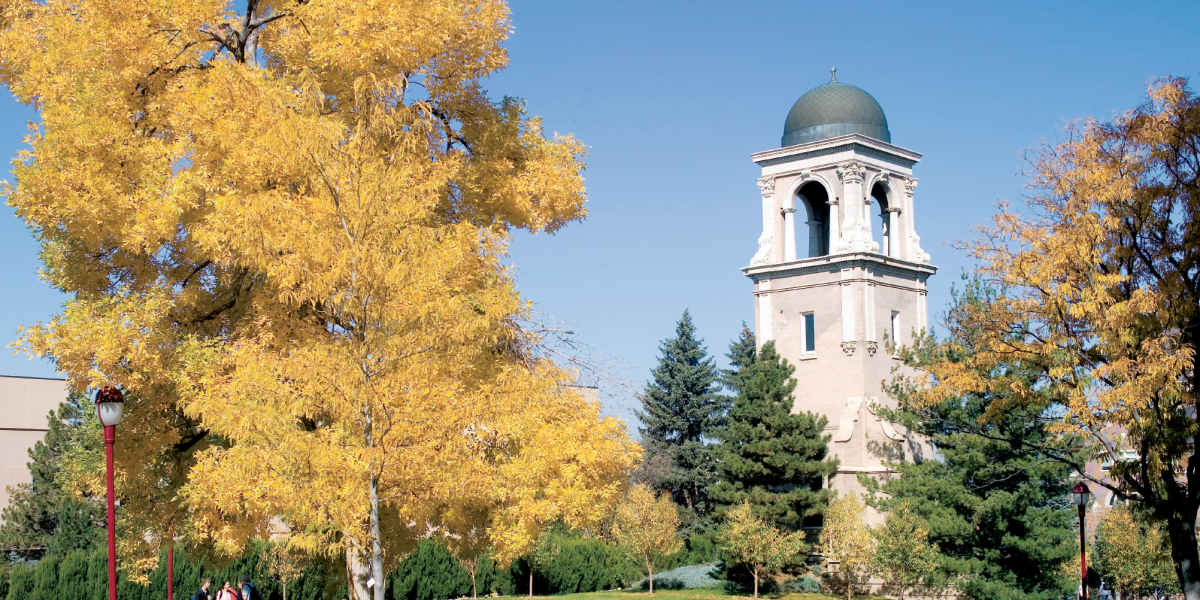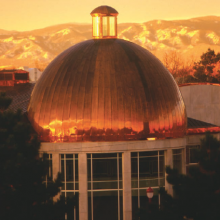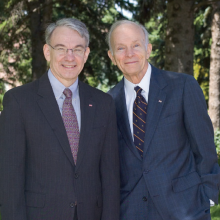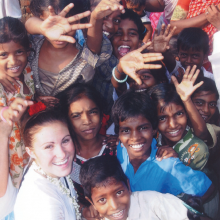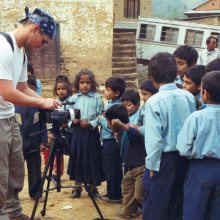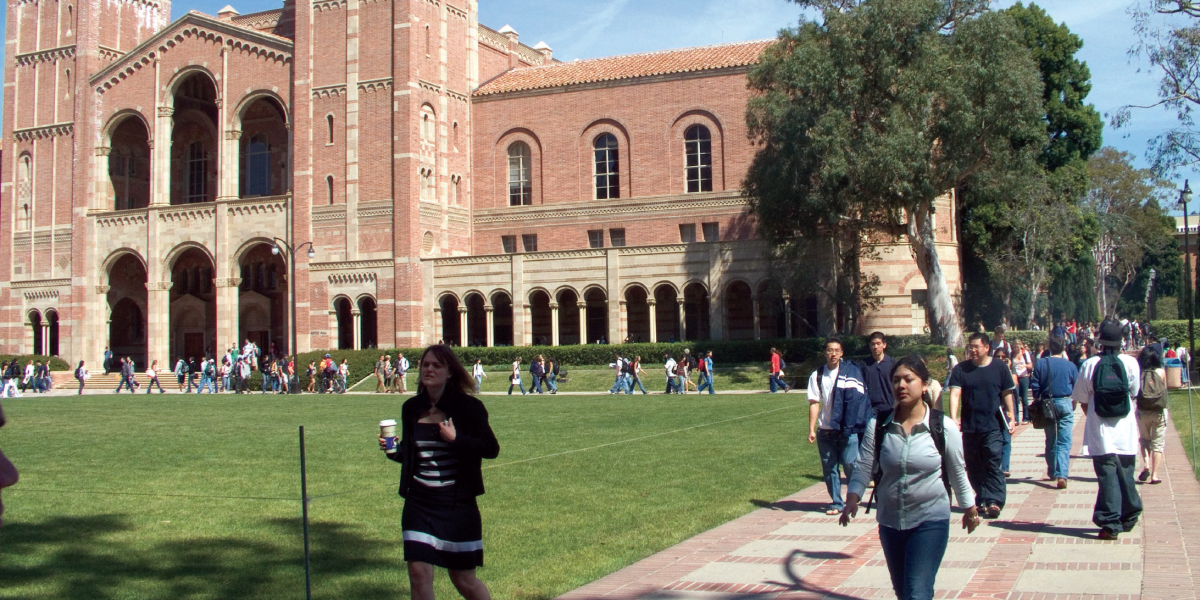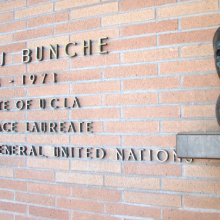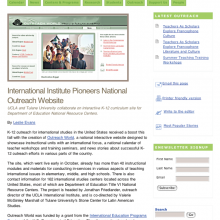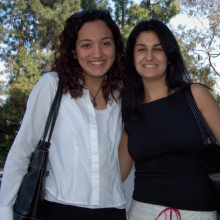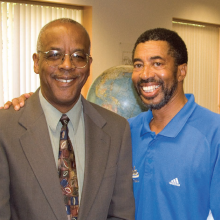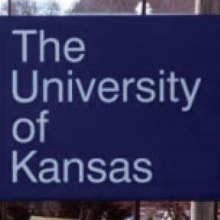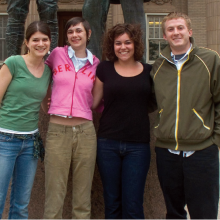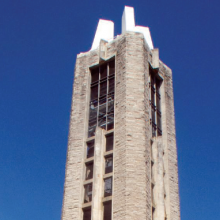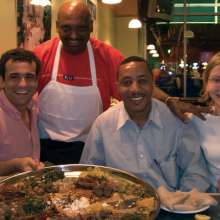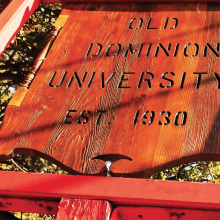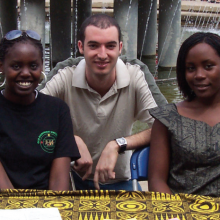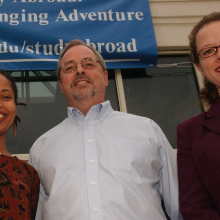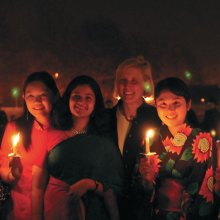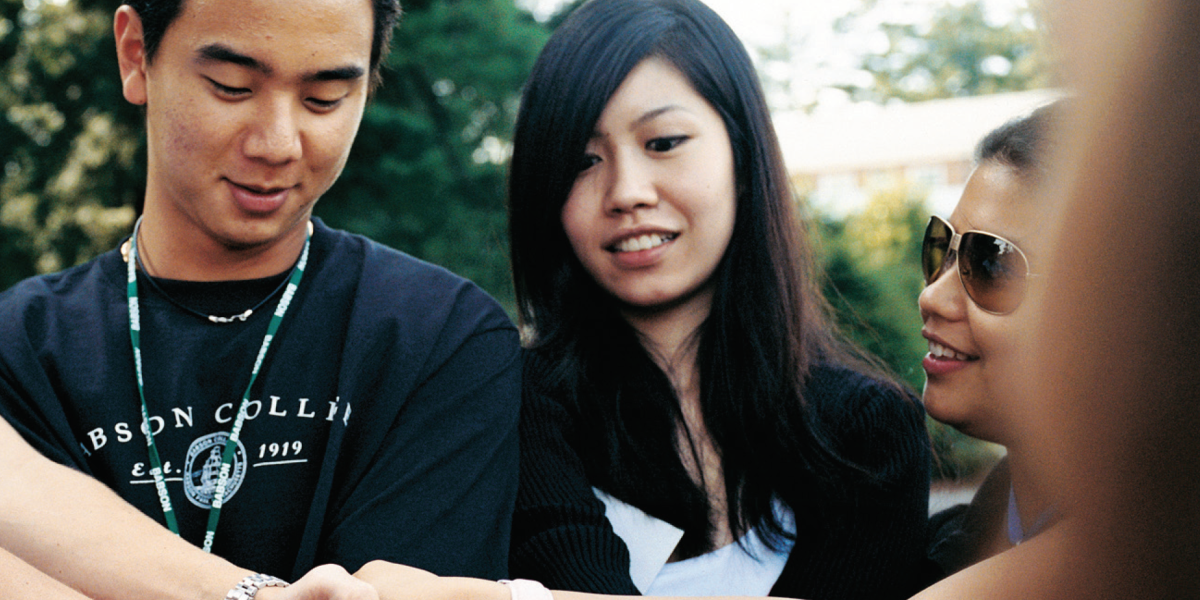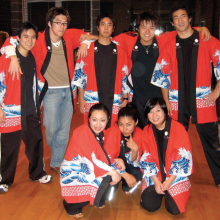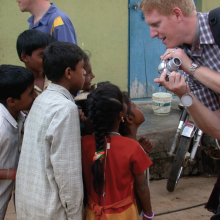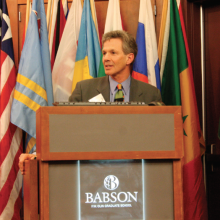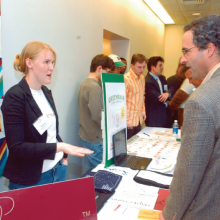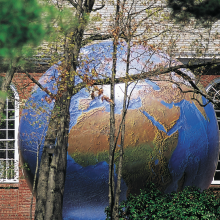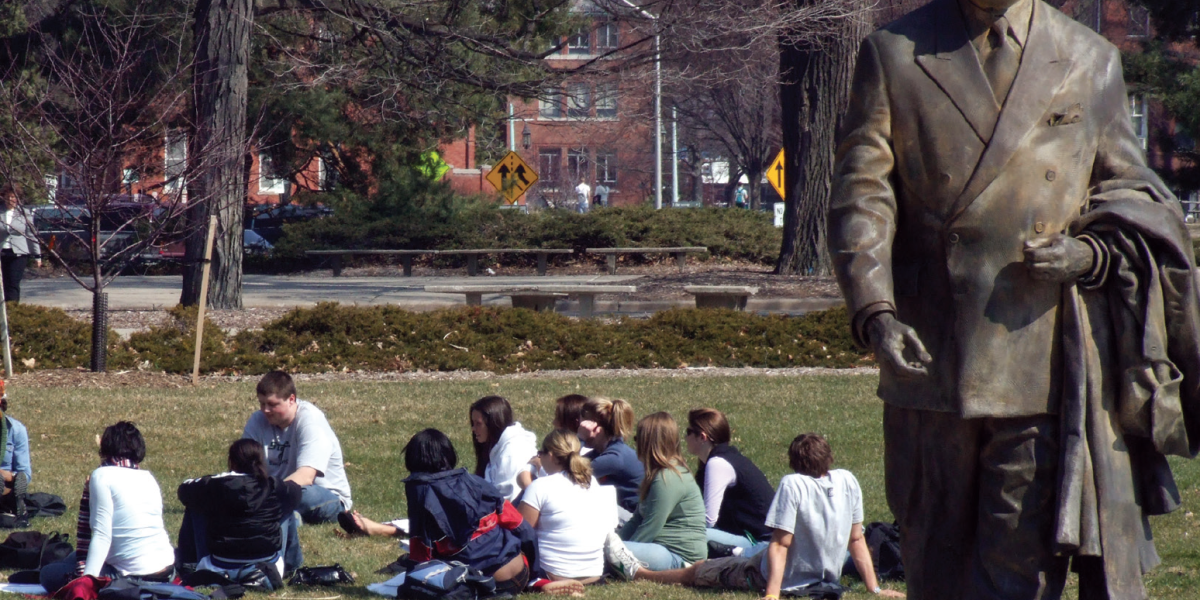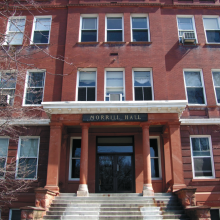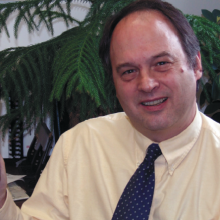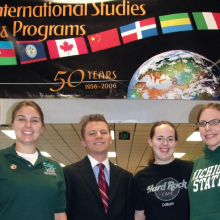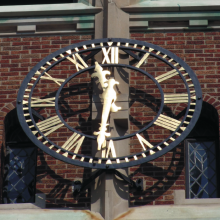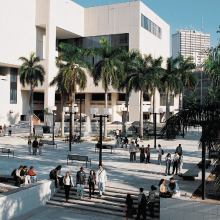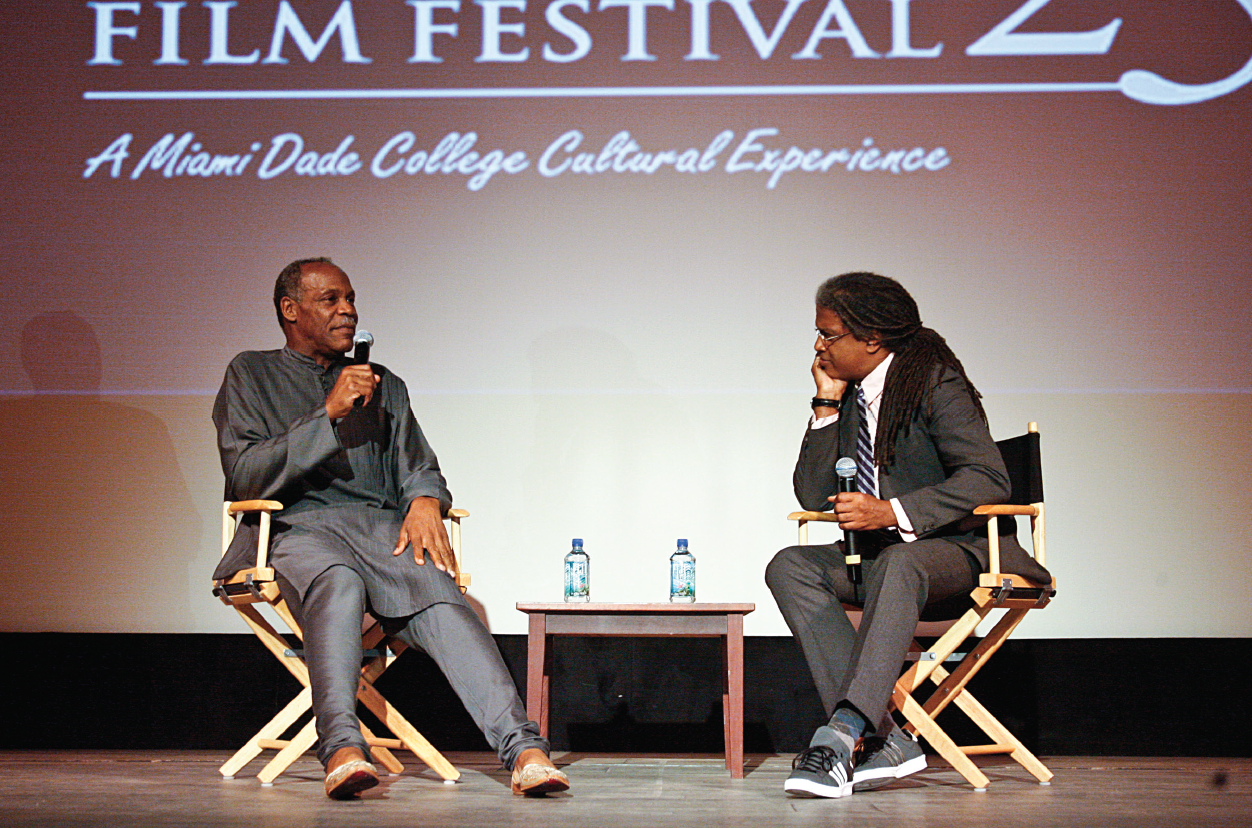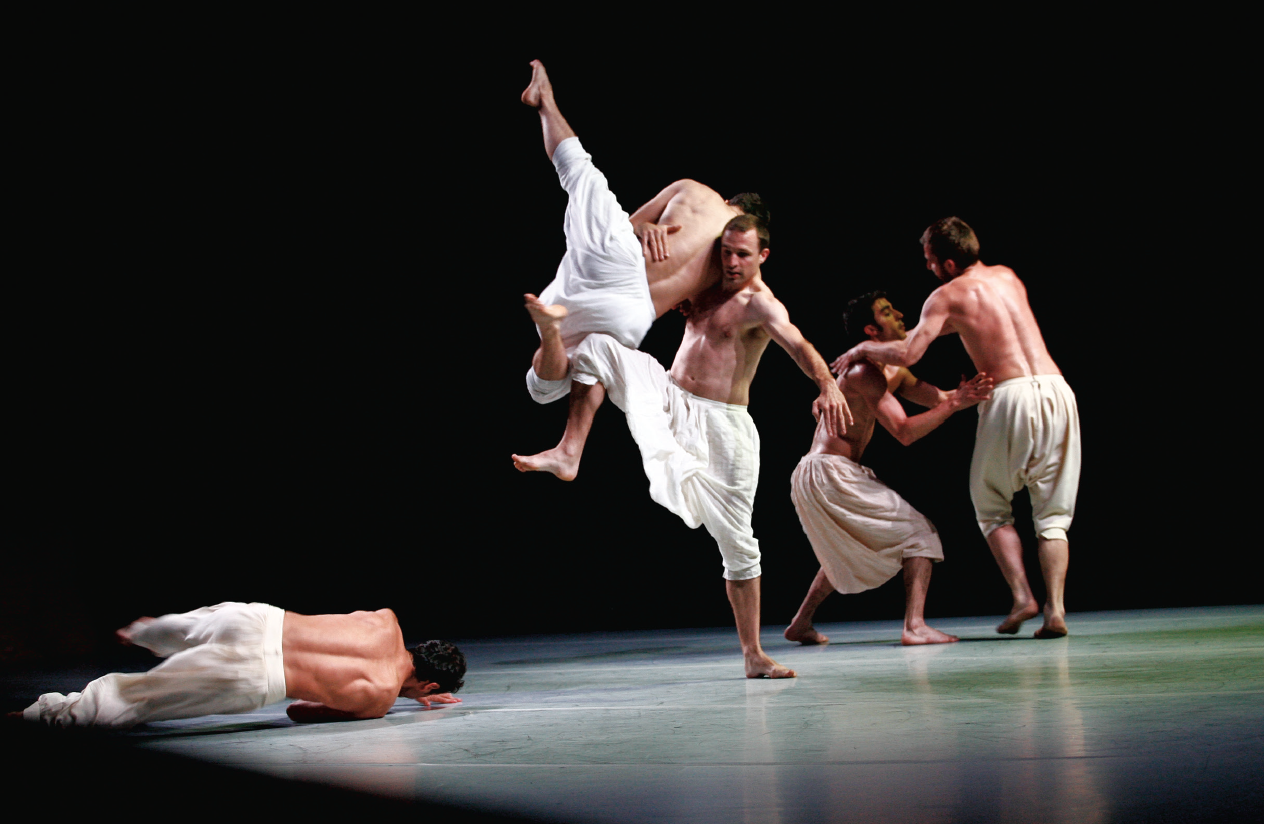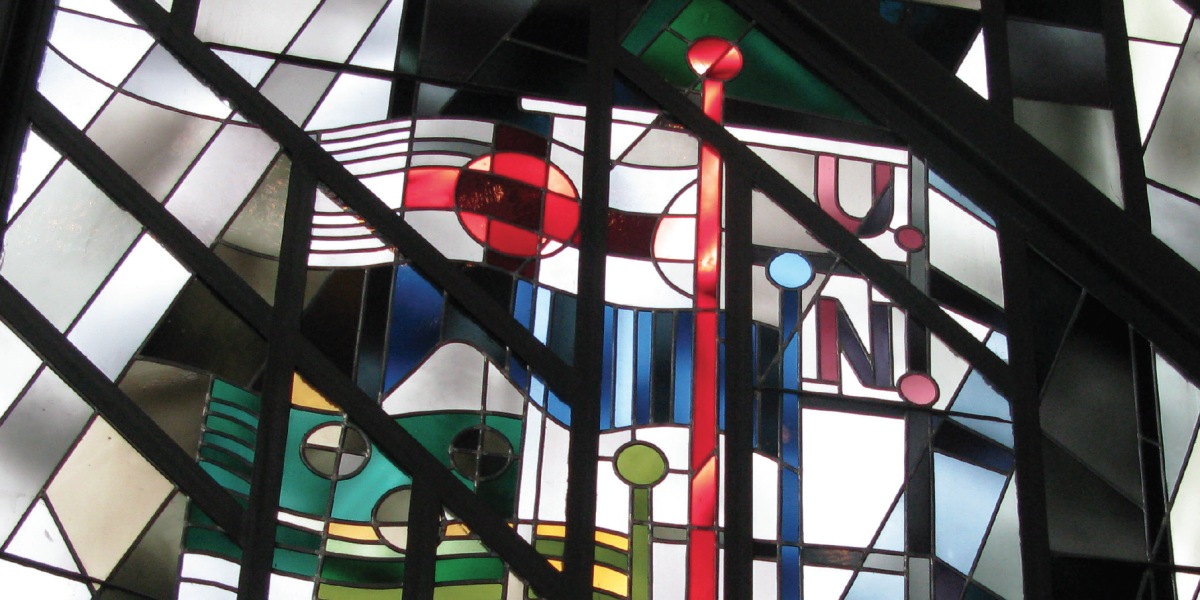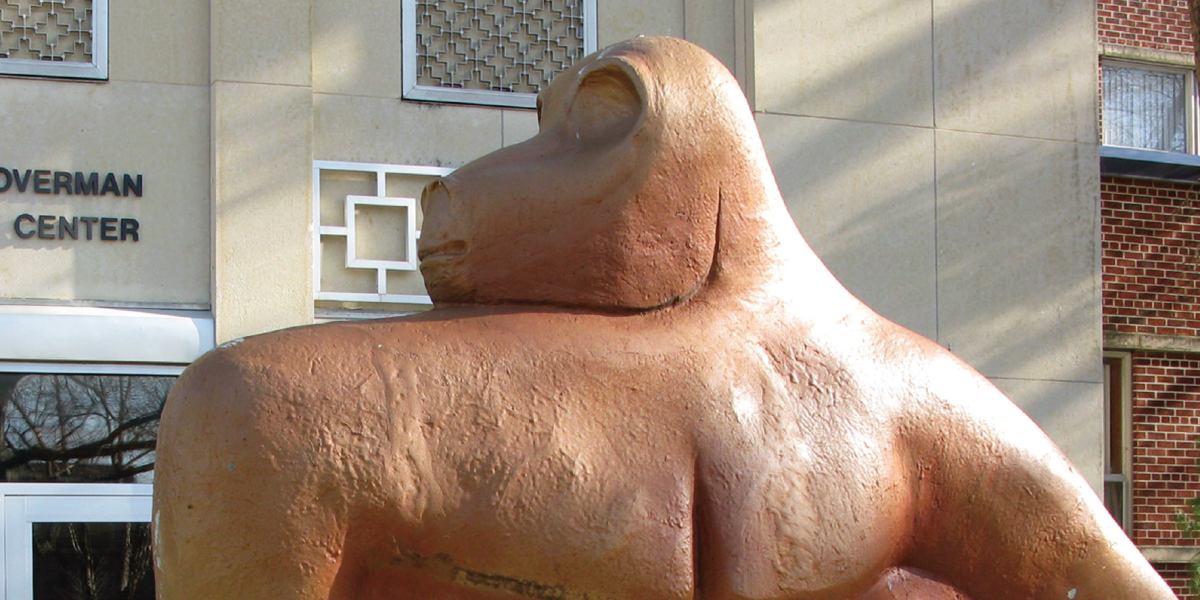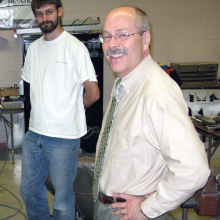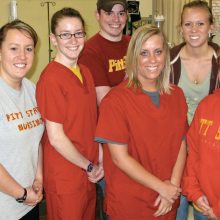Program Development and Delivery
2005 Spotlight University of Denver
A few years back, The Chronicle of Higher Education asked college presidents to muse on what they’d do with a $1 billion gift with no strings attached. The University of Denver’s then-Chancellor Daniel L. Ritchie immediately responded: “Send every student abroad for study at no extra cost, including travel.”
But Ritchie wasn’t just wishing. He explained to the Chronicle that the University of Denver already had a plan in the works to send every undergraduate with grades of B or better to study abroad, and it was financing this out of pocket. A $1 billion windfall would just let Denver start doing this sooner.
Scholarship Program Takes Students Abroad
The University of Denver launched its Cherrington Global Scholars program on schedule in September 2004, sending the first 347 students to spend the fall quarter at more than 60 sites overseas. Many were prominent universities with which DU has painstakingly forged bilateral agreements to ensure that the coursework is compatible with the majors of DU students from programs as diverse as music, engineering, business, and social work. “There simply is no better preparation for the challenges that lie ahead for our students,” said Ritchie, a former corporate CEO who retired as chancellor this past summer after executing a remarkable turnaround in the University of Denver’s fortunes over 16 years.
The Cherrington Global Scholars program—named for a former chancellor and prominent international educator [see box, The Cherrington and Korbel Connections]—has attracted curiosity in academic circles. “People ask all the time: ‘Who is this Cherrington that gave the money?’” said Carol Fairweather, director of the Study Abroad Office. “But it didn’t come that way. It didn’t come with an endowment. It’s written into the university budget.”
As Ritchie wrote in response to the Chronicle’s $1 billion question, “When students immerse themselves in study abroad and constantly use another language, it forever changes their worldview and their potential for growth. It’s even truer now than before September 11.”
The University of Denver long had been sending students to study in other countries, but not in the numbers that Ritchie, then-Provost and now Chancellor Robert Coombe, and legal scholar Ved Nanda, the vice provost for internationalization, had in mind. When Fairweather came on board nine years ago, she was the sole person in the study abroad office. “Now there are six of us,” she said in her Scottish burr. In 2001 the university enlisted George Boyd, a former dean of humanities and study abroad director for Trinity University, to serve as director of international site development, a position from which he traveled the world to forge more than 40 exchange agreements with leading universities. Boyd is now associate vice provost for internationalization.
The university enrolls 9,600 students, including 4,500 undergraduates, 55 percent from outside Colorado. Nearly 700 are international. With the launch of the Cherrington program, the university is aiming for 60 percent of its undergraduates to study abroad for at least a quarter. It’s not surprising why more students are taking DU up on the offer.
The students pay just a third of their tuition (roughly $9,000) plus a share of room and board, but the university picks up the rests of the costs of their studying abroad. “We pay all their travel expenses, not just the airfare,” said Fairweather. “If they are going to Aix-en-Provence, we pay the airfare to Paris, and then the train or flight down. It’s visas, entry permits, International Student ID card, medical insurance if that’s mandatory, and any additional expense.” Some students spend 15 weeks studying overseas, which is more like a semester than a quarter, but they are still charged only a third of tuition.
DU still sends students on other study abroad programs as well. All told, the number studying abroad jumped from 221 in fall 2003 to 405 in fall 2004.
The University of Denver invests heavily in the Cherrington program. Most of the tuition payments are passed on to the partner universities. The program’s costs topped $4 million in the first year, and was projected at more than $5 million for 2005–2006.
Leadership and Campus-Wide Support
“How do we do it? The answer is that Chancellor Ritchie was and is a man of great aspirations for the university and high educational ideals, and he decided this was a very high priority,” said Boyd.
Eric Gould, an English professor and former vice provost who chairs the Cherrington Global Scholars Faculty Board, said, “It’s very much the will of the chancellor and the provost that this succeed, and it’s not just them. It’s the deans, the departments, and the faculty–we all believe in this as a very important educational exercise.”
The faculty are also deeply involved in making sure these study abroad experiences fit smoothly into students’ majors. “It’s very complicated to do it well,” said Ritchie. “You’ve got to get faculty from each of the disciplines involved. You’ve got to prepare students not only for the logistics of going, but in their studies and disciplines, and making sure that we can give credit for it.”
“It’s unusual for a school with so many professional programs, especially those offered at the undergraduate level, to integrate study abroad as easily as we have done,” said Gould. “Even some of the difficult majors like engineering, music, and art, which have very, very tight curricula, are making special efforts to ensure that their students travel.”
DU is among the largest private universities between Chicago and the West Coast. The study abroad numbers had been growing even before the Cherrington program. Based on the 2002–2003 numbers, it ranked seventh nationally among doctoral/research institutions in Open Doors 2004, the Institute of International Education (IIE) report, with fully half of undergraduates studying abroad by the time they graduated. However, most then were going on short study abroad trips, usually during the summer.
The university made meticulous preparations for the launch of the Cherrington program, canvassing almost every office on campus from housing to the registrar to financial aid that “might be caught in the ripple of Cherrington,” as Fairweather put it. It convened town hall-style meetings to discuss how to deal with the ripple effects.
“With the advising and the new opportunities available, we are seeing students move into destinations that were not popular before,” said Fairweather. “We’re seeing them spread out. We’ve got many more students interested in Japan and we have students going to India. We started a program with DIS in Denmark.”
While still provost, Coombe offered $30,000 in grants for departments to send faculty overseas to find suitable new academic partners for their majors, in addition to the many that Boyd found.
“A couple of schools are on our list primarily because I was looking for an engineering fit. The Budapest Institute of Technology is the best example,” said Boyd. “We’re adding Monash University in Australia, partly for engineering and partly for art.”
“We know students will still want to go to Australia and certain places that have been popular for years. But George has filled in the holes in the wall where the music students and engineers need to go,” said Fairweather.
To ensure that music majors not only received instruction in their instrument, but also got opportunities to play in ensembles and found “just the right course in the music history sequence,” Boyd arranged exchanges with the Institute for the International Education of Students (IES) in Vienna and Milan. They also can enroll in a Brisbane, Australia, conservatory.
The engineering department reconfigured requirements to make it possible for majors to study abroad at the start of their senior year. “I thought it quite remarkable that a very technical department like engineering would adjust its curriculum to make a slot where study abroad would fit better,” said Gould.
Nanda, who holds two endowed chairs in addition to serving as vice provost for international programs, calls what has happened at the University of Denver “a miracle.” He continues, “Internationalization and international life and culture have become part of the mainstream of life on this campus. It’s wonderful that it happened, and very, very heartening.”
2005 Comprehensive UCLA
In the higher education world, college and university rankings are a source of endless fascination and endless frustration for administrations and admissions officers. They come in all sizes and shapes, some with impressive imprimaturs (i.e., the National Research Council’s periodic ratings of graduate programs) and others that mix a scintilla of scientific precision with an overlay of academics’ opinions and impressions (i.e., U.S. News & World Report’s cottage industry of rankings). There is one common denominator that binds together most of America’s greatest research campuses, public and private: they belong to the Association of American Universities, an organization of 62 leading North American universities—60 in the United States and two in Canada—whose members award half the doctoral degrees and account for 55 percent of the research in the United States each year. Its roster is often regarded as a Who’s Who of North America’s greatest universities.
The University of California at Los Angeles won admission to AAU’s exclusive ranks in 1974 (74 years after the University of California at Berkeley, one of the founders), and UCLA Chancellor Albert Carnesale often makes the largely unassailable observation that his institution can lay claim to this title: the best comprehensive, public university in any of America’s largest cities. “If you stop and think about it, UCLA is quite unusual in that sense,” said Carnesale, a onetime nuclear engineer who redirected his career and scholarly passion into public policy work after participating in the original Strategic Arms Limitation Treaty (SALT) talks 35 years ago. “It’s not New York. It’s not Boston. They have great universities, but they are not public. It’s not Chicago. It’s not San Francisco. Berkeley’s at Berkeley. You start going down the list, and they don’t have great public universities in the (big) cities.” There’s the University of Washington on the lakefront in Seattle, a city of 563,000, and the University of Texas at Austin, in the Texas capital, where 656,000 people dwell—but neither comes close to the population of the City of Angels (3.8 million). The handful of public universities with reputations as large or larger than UCLA’s are in smaller places, from Chapel Hill, North Carolina, and Charlottesville, Virginia, to Ann Arbor, Michigan, and Madison, Wisconsin. (And, of course, in the aforementioned Berkeley, population 102,000.) This New York City and Cambridge, Massachusetts, expatriate now has this to say about his adopted hometown: “Los Angeles is perhaps the most exciting, dynamic, global city anywhere, not just in the United States.”
College presidents and university chancellors everywhere are nothing if not super salespersons for the place they call home. The 69-year-old Carnesale is a proud, purposeful, and extraordinarily successful pitchman. Since moving west in 1997 after 23 years at Harvard University—where he was professor, dean of the Kennedy School of Government, and provost—Carnesale has helped UCLA raise upwards of $2.5 billion—more than any public university, and $3 billion is in sight before he steps down as chancellor in June 2006 to resume teaching. Carnesale marshals these arguments for a point: UCLA is a very international, interdisciplinary university that happens to sit in the middle of one of the most multicultural, polyglot cities in the world.
Leaders for an Interconnected Global World
Now, “urban” isn’t the first word that comes to mind upon stepping foot on UCLA’s gorgeous Westwood campus, a few miles south of the HOLLYWOOD sign and a few miles east of the Santa Monica beaches. But “international” is. With five Nobel Laureates on the faculty, and four others among its 330,000 alumni—including Ralph Bunche ’26, the scholar-athlete who won the Nobel Peace Prize in 1950 for brokering a truce between Arabs and Jews in the Middle east—and with 38,000 students and a faculty of 3,300, UCLA is deeply involved in international education and research. As Carnesale wrote in an introduction to UCLA’s global programs and activities for UCLA Magazine (Winter 2004), “At UCLA, scholars from a wide range of disciplines prepare the next generation of leaders who will not only be outstanding scientists, teachers, artists and citizens, but who also will function effectively in an interconnected global world.”
Carrying the banner and providing the central administrative and intellectual focus for these activities is the UCLA International Institute, which occupies two upper floors of Ralph Bunche Hall on the compact campus (among the nine University of California institutions, UCLA has the curious distinction of having the largest enrollment and the smallest campus—419 acres). Under the purview of the International Institute are 15 research centers and separate programs on almost all regions of the globe, nine interdisciplinary degree programs, including a new, enormously poplar Global Studies major; language studies (UCLA regularly teaches more than 40 languages, including Afrikaans, Hausa, Quechua, Bashkir, Uzbek, and Catalan), study abroad, community outreach, and numerous global research initiatives. The Burkle Center for International Relations brings national and international leaders in business, government, education, and civic life to campus and holds forums addressing public policy conundrums.
Geoffrey Garrett, who served as vice provost and dean of the International Institute from 2001-2005, said, “It is very arguably the case that UCLA has more and higher quality faculty in international studies than anywhere else in the United States.” He acknowledged that some might argue that that distinction belongs to the University of Michigan or Berkeley, “but I would make the case that we’re bigger and better than both in international. And none of the privates with the possible exception of Harvard can match our scope.” (Garrett recently moved across town to assume the presidency of the Pacific Council on International Policy at the University of Southern California.)
The numbers bear out Garrett’s claim. In the 2004 Open Doors report, UCLA led all public institutions in the number of students’ studying abroad: 1,917 in 2003–2003 (only New York University sent more: 2,061). Many go through the Education Abroad Program Office which, working through the University of California System EAP office in Santa Barbara, places students at more than 140 institutions in 33 countries. A large and growing number head overseas each summer in travel study programs led by UCLA faculty. The Summer Sessions and Special Projects office enrolled a record 969 students in 29 programs around the world in summer 2005. And UCLA has a separate office that arranges internships and service opportunities and helps other students directly enroll in scores of universities overseas. The Anderson School of Management arranges exchanges each fall for 60 second-year MBA students, at the same time hosting as many from 47 international business schools.
“The exchange program is a big selling point for us in our recruiting for this school,” said Susan Corley, director of student services for the UCLA Anderson School of Management.
Not content with the existing cornucopia of study abroad offerings, UCLA launched in 2004 an intensive new summer model that sent 25 students to Tongji University in Shanghai to study Asia’s emerging economies for a month. In 2005 the International Institute expanded this new Global Learning Institute to offer summer classes at host universities in Hong Kong, Vienna, and Guanajuato, a colonial town in Mexico, and more are in the offing.
“We’re not trying to duplicate existing opportunities or denigrate the traditional model… but it’s time to expand opportunities,” said Garrett, an Australian-born political economist and authority on the globalization of markets.
Last spring more than 400 students signed up for UCLA’s first Global Studies class. Guest lecturers include Chancellor Carnesale—who regularly teaches and lectures at UCLA about disarmament and international relations—former U.S. Secretary of State Warren Christopher, and former U.S. Trade Representative Mickey Kantor.
Political Science Professor Steven L. Spiegel, the associate director of the Burkle Center and a Middle East expert, said all top universities have international relations centers, but UCLA’s has “a unique combination of breadth and depth.”
Spiegel joined the UCLA faculty in 1966 after completing graduate work at Harvard. “It’s a much bigger and much more complicated place today,” he said. “UCLA has very broad regional interests. It clearly has the top Middle East program west of Chicago.” It has Arabists, for instance, in anthropology, sociology, and political science as well as in language studies. Ironically, he said, decades ago when Berkeley and UCLA decided to divide the world for the purpose of area studies, Berkeley took Europe and Asia—then of foremost interest to the United States—while UCLA got the Middle East and Africa. “In a way, they were sops to the second rung school. Now the Middle East is the number 1 issue,” said Spiegel (both UC schools now cover all these areas).
Nearly 600 UCLA undergraduates and 150 graduate students are pursuing degrees in the International Institute’s degree programs, which include a Ph.D. in Islamic Studies.
“I’ve tried to create a two-dimensional intellectual architecture for the International Institute,” said Garrett. “One dimension, the pillars, is area studies the way we’ve always done it.” The second dimension “is where you wave these big global themes—global studies, migration studies, international development studies— among the area pillars.”
Political scientist Ronald Rogowski, a son of Nebraska sharecroppers who is an authority on international trade and a champion of interdisciplinary work, is UCLA’s new interim vice provost and dean of the International Institute. He was already serving as the institute’s associate dean and had played a key role in bringing in its first class of Global Fellows—promising young scholars at early stages of their career who get to spend a year on the Westwood campus pursuing international research and teaching seminars— as well as reshaping its Islamic Studies program and opening a new Center for India and South Asia.
Issues in the Developing World
International Development Studies, which examines the problems and issues faced by the world’s poorest countries, attracted 25 majors when it started in the 1980s. Today it is a virtual behemoth with 350 majors. Its director, Michael Ross, an associate professor of Political Science, said, “It’s a great program for students who want to spend time in a developing country and learn that country’s language, and who are interested in real world political and economic issues.”
Ross, whose specialty is researching the protection and destruction of natural resources in such developing countries as Indonesia, Malaysia, and the Philippines, said the program’s majors are undaunted by rigorous requirements, including two years of language and a capstone senior seminar that requires significant research. “Most of our students spend from a summer to a year abroad. A lot, given the make-up of Los Angeles, will go to Latin America or Asia,” where they have family roots, he said.
“For what I do—the study of politics in the developing world— UCLA is the best place in the country,” said Ross, once a senior congressional aide to then-Rep. Barbara Boxer (D-Calif.) and the late Rep. Ted Weiss (D-New York).
Public and Social Policy Studies
A young faculty star, Amy Zegart, assistant professor of Policy Studies at the School of Public Policy and Social Research, has connections on the other side of the political fence in Washington. Amy Zegart is an expert on the CIA and national security issues; her thesis adviser at Stanford was Condoleezza Rice, now the secretary of state. Zegart was one of the “Young Turks” in academe that the Bush campaign drew on for foreign policy advice in the 2000 presidential race. Zegart’s 2000 book, Flawed By Design: The Evolution of the CIA, JCS and NSC, became required reading in Washington after 9/11.
Zegart, who spent three years as a McKinsey & Co. consultant before taking the UCLA job, said, “I joke that anything scary I’m naturally interested in. I’ve always been fascinated by politics, conflicts, foreign policy.”
The Harvard and Stanford graduate said, “One of the great joys coming here was the satisfaction of the mission of the public university. I have incredible students. One woman’s parents never finished high school in Mexico. She was in my seminar and now she’s in graduate study in international relations. It’s really exciting to teach kids from all these different backgrounds and to see them light up and to open doors for them.”
Zegart also savors the international flavor of UCLA and Los Angeles. “You can’t help but be acutely aware that we are part of a broader international community. I hear Spanish all over the place. My 5-year-old is learning Spanish,” she said. “The borders are porous and you sense that every day living in Los Angeles. There is an excitement about that, too.”
In six years on the faculty, she has witnessed a dramatic growth in student interest in foreign policy issues. Of course, she added, “in California, local issues are international issues, too: whether immigrants can get free medical care, whether they can go to public school, whether they can have a driver’s license. Students today are much more aware of the world than when I started college 20 years ago.”
Getting Students Out Into the World
Ninety percent of the undergraduates at UCLA are Californians (the same is true at Berkeley and other UC campuses); only 2 percent are international students. The graduate student population is far more international. In Fall 2002, 1,700 of UCLA’s 2,400 international students were pursuing graduate studies.
Chancellor Carnesale says that the 90 percent Californian statistic can be misleading. “A remarkably high proportion have at least one parent born offshore, and many of them were as well. They bring two cultures to the party,” he said.
Still, it explains why UCLA places such heavy emphasis on study abroad. “If it’s harder for us to get foreign students on campus, what we have to do is think really creatively about how to get our students out into the world,” said Garrett.
Garrett said it was his aim at UCLA to provide more options for students to study abroad, and to make it easier for them to apply credits earned abroad to their major. “We have two polar models at the moment. At one end of the spectrum is the classic [education abroad] immersion program where you pick up a student in Westwood and drop them down in the University of Beijing. They take courses with Chinese students taught by Chinese professors, and that’s great, and then they come back and they have to haggle with the Political Science department to see if they can get credit for that stuff toward their major. It takes a lot of time, a lot of individual counseling.”
At the other end of the spectrum, he said, is travel study, usually taking place over the summer, “A UCLA professor teaching a UCLA class takes students to Stratford-on-Avon and they teach Shakespeare,” said Garrett. They are guaranteed UCLA credit, but there is no guarantee that they will gain much international exposure during weeks spent on trains and in hotels with UCLA classmates.
Global Learning Institutes
That is why the International Institute has developed the Global Learning Institutes, which Garrett said offer “the best features of both models. We’re partnering with foreign universities to allow our students to take courses taught not only by UCLA faculty, but team taught with local faculty. The students will live in dormitories with local students and other foreign students who are there.”
“You have all these global themes in the world these days—markets, democratization, culture, and identity—[but] they play out very differently in different parts of the world,” said Garrett. Globalization looks very different in Shanghai, in the midst of the Chinese economic boom, than it does in Mexico, where “people are very dispirited… about how they were going to benefit from NAFTA and opening to the rest of the world. It’s very important for our students to understand that even if these things are a global phenomenon in some sense, the local realities are very different.”
Nick Steele ’05 of Long Beach, California, went on the inaugural Global Learning Initiative trip to Shanghai last summer. He got a scholarship from the International Institute, and it also helped him and three other students land August internships at a Shanghai consulting firm. “There’s so much going on at UCLA,” said Steele, 21, a leader of the Undergraduate International Relations Society. “I The UCLA International Institute excels at outreach—outreach to the citizens of Los Angeles, and outreach to scholars and ordinary people around the world. It has long been involved in providing seminars and training for K-12 teachers on international issues. In recent years it has supplemented the classroom sessions with superb, savvy, and resource-rich Web sitesnever would have been able to find that internship on my own.” After graduating in May, he headed to Hong Kong to teach English.
Integrating Internationalization
Throughout the Curriculum The International Institute boasts a $15 million budget and extensive connections with virtually every academic unit on the Westwood campus—not just the political scientists, economists, and anthropologists, but with professors from the School of Theater, Film and Television, the School of the Arts and Architecture, and many other disciplines. “People in the film school are very interested in China, and I’m working closely at the moment with people in Arts & Architecture about the Middle East. Our Public Health schools work all over Asia, Africa, and the Middle East,” said Garrett. “We have Music, Ethnomusicology, and Musicology here, three [separate] departments. We have Art and we have Art History. We don’t have a shortage of resources. It’s getting them all together.”
Before the creation of the International Institute, UCLA had an international arm called International Studies and Overseas Programs (ISOP). It has taken on much broader duties in its new incarnation. When former Chancellor Charles Young wanted to strengthen UCLA’s international work, he gave ISOP 20 new faculty positions, but they were just meted out to academic departments, since the ISOP had no educational programs of its own.
Now the International Institute is looking to build on its strengths with joint faculty appointments. “That’s a new phenomenon here,” said Garrett, who predicted that within five years, “these top two floors of Bunche Hall, instead of looking like an administrative unit, will start looking more and more like an intellectual unit, with lots of faculty permanently around, teaching more and more students.”
Outreach Challenges
The UCLA International Institute excels at outreach—outreach to the citizens of Los Angeles, and outreach to scholars and ordinary people around the world. It has long been involved in providing seminars and training for K-12 teachers on international issues. In recent years it has supplemented the classroom sessions with superb, savvy, and resource-rich Web sites.
The Web sites are the handiwork of Jonathan Friedlander, who is both the outreach director for the International Institute and assistant director of the UCLA Center for Near Eastern Studies. Friedlander was born in Israel, came to the United States at age 12, spent his teenage years in Brooklyn, and earned a Ph.D. in Middle East history from UCLA. He speaks Hebrew, Arabic, Farsi, Spanish, and Portuguese.While finishing graduate school, he wrote a grant proposal to do an educational documentary on the life of Arabs in America. “It scored so high, UCLA kept me around writing proposals for the next 30 years,” he said with a laugh.
Teacher training materials that he helped develop for the Middle East Center became the model for all of UCLA’s Title VI-funded National Resource Centers (NRCs). His latest creation, funded by a $300,000 U.S. Department of Education grant, is Outreach World, a Web resource that posts hundreds of links to curricular materials and other resources from all 120 national resource centers. It is searchable and, thanks to Friedlander’s deft photography, easy on the eyes. “It showcases the K-12 outreach programs for all the NRCs in the United States. Before they were just talking to themselves,” he said.
For the Middle East center, he created a Web site that offers Turkish language lessons, including a digitized soap opera that students can watch online, slowing it down and repeating dialogue as necessary. Similar online courses are planned for Iraqi Arabic and Azeri. “It’s an incredible platform,” Friedlander said.
Val D. Rust, a professor of Social Sciences and Comparative Education in the UCLA Graduate School of Education & Information Studies, wears several hats in the university’s large study abroad enterprise. He is the faculty director of the Education Abroad Program and associate director of the Center for International and Development Education, which carries out extensive research in conjunction with UNESCO, foreign education ministries, nongovernmental organizations, and other universities around the world. His doctoral students are researching such topics as the effectiveness of study abroad, the difficulties students face in securing credit for overseas work, and comparisons between U.S. and Japanese schools.
Earlier in his career, Rust spent two years in Germany as a country director for the University of California study abroad program. One thing that motivates Rust is UCLA’s annual survey of the attitudes of incoming college freshmen across the nation. That survey shows that up to half of students enter UCLA thinking that they will study abroad, but only a small percentage wind up doing so.
“To me it’s all a resource issue,” said Rust. “We could very easily double and triple the number of [UCLA] students going abroad if we had the kind of resources that would allow us to do extensive marketing and preparation for those students.” He laments that the EAP office skipped holding an annual recruiting fair “simply because we know from experience that we would be overwhelmed by students coming in to the office and wanting information.” As it stands, 4,000 students find their way into the EAP office in the basement of Murphy Hall each year. Many are greeted by some of the 25 volunteer peer advisors who wax enthusiastic about their own study abroad experiences.
“It’s just putting a human face on the experience,” said Zahra Bazmjow, 22, of Temecula, California, an English major and Spanish minor who studied abroad for a year in Spain. Her parents, immigrants from Afghanistan, were not keen on her studying abroad.
“Nobody in my family had ever done it and none of my friends had studied abroad. For me it was just kind of a leap into the unknown,” said Bazmjow. During orientation before departing UCLA, a student talked about his time studying in Spain “and I remembered every word he said. The little tidbits that he gave us were like gold.”
Mitra Jalali, 22, of Orinda, California, who just graduated with a degree in philosophy, said her parents tried to discourage her from studying in Cork, Ireland, even as they were driving her to the airport. Jalali, who was born in Iran, said, “I didn’t have anyone to push me to go or to tell me how wonderful it was.”
But both young women credited International Programs Counselor Sergio Broderick-Villa with convincing them to go after they started to get cold feet.
Gary Rhodes ran UCLA’s Education Abroad program in 2004-2005 before returning fulltime to Loyola Marymount University, where he directs the Center for Global Education, a Fund for the Improvement of Postsecondary Education (FIPSE)-funded national resource center that has been a leader in raising awareness about health and safety issues in study abroad. Rhodes started the center in 1998 at the University of Southern California to help study abroad professionals share information about best practices and access government resources on safety issues. The center also works to promote diversity and encourage more minority students to study abroad.
Serving International Students and Scholars
UCLA operates a latticework of services to make international students feel welcome on campus, including the Dashew International Center—run by former Los Angeles controller Rick Tuttle— and the Office of International Students and Scholars, both in Tom Bradley International Hall (named after the former mayor who brought the Olympic Games to Los Angeles in 1984).
Lawrence A. Gower, the director of the Office of International Students and Scholars, is a 1964 alumnus who played on one of John Wooden’s NCAA championship teams, behind All-America guards Walt Hazzard and Gail Goodrich (“There was some distinction between their ability and mine; I only played when we were up by 102-36,” Gower quipped).
“We’re situated in the division of student affairs, which gives us a value-oriented approach to the students and scholars who come our way,” said Gower. “We have excellent relations with admissions and the registrar … and make sure their academic experience is the best that they can possibly have” while also helping them keep their visa status secure.
With the Dashew Center, the office also helps incoming international students make sense of the fact that, as Gower put it, “L.A. in reality is different than the L.A. shown on CNN and on ‘The Bold and the Beautiful.’”
Gower and his chief lieutenant, Jimmy D. White, a UCLA Law alumnus who is the office’s senior supervising counselor, said their experience with SEVIS (the U.S. government’s Student and Exchange and Visitor Information System) has generally been positive.
“The stakes are higher and the job is more intense after September 11,” said Gower. “A lot of people felt like we had all this new emphasis. What we had were responsibilities that we were taking care of on paper advance to an electronic reporting system, making what we do a lot more transparent immediately than it had been.”
The benefit of that transition, he said, is that his office is now able to aggregate the data more effectively and use it to show “what we’ve been saying for years, that we bring the best and brightest students here to complete their studies and make a difference when they return home.”
“While the method of getting there might have been less calibrated than we wanted, the outcome is that none of our students have been dramatically hurt by or set back through SEVIS,” said Gower.
White added, “Our campus culture allowed us to smoothly go through the process of putting in place the kind of robust technological and human service interfaces that we came up with. The technology we use and the SEVIS system itself require you to organize things a lot better and therefore solve problems—which is what we’re all about.”
Gower said the clichéd image of Los Angeles “is Ferraris, Hollywood, affluence—‘Let’s do lunch.’ The reality is that it is both more complex and accepting than they can imagine. The fact is, if they don’t want to be viewed as an international student, they don’t have to here. Nobody knows whether you’re Japanese American or Japanese.”
Integrating All Aspects of the UCLA
Mission Carnesale said that soon after he arrived, he began telling friends back in Cambridge that “one of the most difficult challenges of being chancellor of UCLA is everybody out here thinks they own the place—and by the way, they do. It’s also one of the most wonderful things. They have a stake in it and care about it and want it to be even better than it is now.”
Alumni are feverishly loyal, but most of the billions that UCLA has raised in recent years come from non-alumni who are proud of the university and who understand “that if it’s going to be a place of real excellence that competes with the finest universities anywhere, it cannot do that solely on state funding.”
It also helps, Carnesale said, that “we’re on the Pacific Rim, which runs not only East-West, but North-South. It’s Latin America and Canada as well as the other side of the Pacific.”
“And of course the action nowadays is the Pacific Rim. Do we have an advantage with Europe? No, the Eastern schools do. Do we have an advantage with Asia and Latin America? Yes, we do. If you just walk around our campus you can see it. If you talk to our faculty, you can see it,” he said.
Carnesale said he was heartened that sight unseen, 400 students signed up for Global Studies 1.
“They don’t know if this is a hard course, an easy course, a good course, a lousy course. All they know is it’s the first time it’s being offered and it really sounds like it’s interesting or important to them,” he said. “So the interest is there. The challenge that lies before us is as follows:
“One is to make sure that whatever we develop integrates all aspects of our mission. It’s got the research element, the teaching element, and the service element. Otherwise, it doesn’t belong at a research university. Our comparative advantage is not that we do all three, but that the same people do all three. That’s what makes a research university different.
“Secondly to make sure that any curricula we develop ensure that the student when they are finished will have experienced an education that has both depth and breadth—nontrivial requirements. It’s very easy to make it all breadth, a little of this, a little of that, and you never learn how to peel an onion. It’s important to learn how to peel an onion. You got to do both things. You got to learn how to peel an onion, and you’ve got to learn that there are different kinds of onions, and finally, that not everything is an onion. “A university education should have all three of those pieces, and whatever we do in global studies has to do that,” said the former SALT negotiator.
“Third, we’ve got to find a way to make sure this is well embedded in our faculty as it exists. We do not want to set up a separate institution someplace else that looks at the rest of the world. This is to be integrated into what we do so we get the benefits of this internationalization across the university; some of these are cultural changes.
“And finally I’d say we’ve got to develop the resources to make sure we do it right.”
University of California at Los Angeles
2005 Comprehensive University of Kansas
Tree-lined Mount Oread is the centerpiece of a sylvan, 1,000-acre campus in one of America’s great college towns—Lawrence, Kansas—with Massachusetts (”Mass”) Street the main artery for an academic community of almost 30,000 students and 2,000 faculty. In a sense, the view from Mount Oread extends far beyond the plains of Kansas. In a university lab, an Indian-born engineer leads a team whose advances in radar imaging allow the world to know how fast the ice is melting in Antarctica. The dean of the Graduate School and International Programs is regularly consulted by nongovernmental organizations and the U.S. Department of State to advise fledgling democracies on setting up political debates. An East Asian historian has made surprising findings about how quickly Japan’s environment recovered from the atomic bomb and other wartime damage.
The University of Kansas—or KU, the transposed initials by which everyone in Kansas calls it—sends more than 1,000 students to study abroad each year and enrolls 1,600 international students at Lawrence. It ranked fourth among public research universities in the 2004 Open Doors report in terms of number of students studying abroad; fully one-quarter of KU graduates spent part of their undergraduate education overseas. Its dozens of study abroad programs attract hundreds of students from other U.S. colleges and universities, both for quality and cost-efficiency. KU has a rich history with the Fulbright program, as both an exporter and importer of Fulbright scholars. From its inception in 1951 and for a quarter-century afterward, scores of foreign Fulbrighters would descend on Lawrence each August for their introduction to the United States before dispersing to their host campuses. Typically two dozen Fulbright scholars are among the 1,600 international students pursuing degrees at KU, and nearly 400 KU students and some 270 faculty have received Fulbright fellowships for study and research in dozens of countries.
“This place is just international,” said Provost and Executive Vice Chancellor David Shulenburger. “Kansas sits here in the middle of the nation. It’s got a great potential to be completely insular in everything it does because of its location, but it’s got industries— aviation and agriculture—that absolutely depend upon the rest of the world. It’s critical to Kansas that we’re able to train students to be able to work in an international environment.”
A Long History of Placing Importance on International Education
This community on a hill, as KU thinks of itself, takes pride in its internationalism. In his first speech on campus a decade ago, Chancellor Robert Hemenway said that no university can aspire to greatness without being international, and it is a theme to which he frequently returns. “Ten years later, the imperative for internationalization of our educational institution at all levels is even more critical,” Hemenway said. KU is striving to advance into the ranks of the top 25 public universities and the emphasis on internationalization is very much a part of its strategy. Research spending is up sharply. And by convincing the Kansas Legislature to let it begin raising its traditionally low tuition, KU has created 100 new faculty positions and expanded scholarships. This campus first built its international reputation in the 1950s and 1960s on area studies and language departments. It won laurels from the Institute for International Education and Reader’s Digest in 1964.
“From the chancellor down to faculty and students, there’s a great thirst for knowledge about the rest of the world.” said Associate Professor of Political Science Erik S. Herron, director of the Center for Russian and East European Studies, a Title VI National Resource Center. “We are in the middle of the country, far from any border, but [everyone] recognizes that we can’t think of ourselves as isolated from the rest of the world.”
Such figures as former Chancellor Franklin D. Murphy (1951– 1960), former Dean of Arts & Sciences George Waggoner, and longtime professor of German John Anthony “Toni” Burzle all played roles in making KU a bastion of area studies. The Latin American, East Asian, and Russian studies programs have been Title VI National Resource Centers for four decades or longer. Schulenburger credits these individuals with turning the university’s focus to international matters far earlier than it occured at other institutions in the Midwest.
While Japan was still under U.S. military rule in the years after World War II, a generation of young scholars from both Japan and Korea was brought to KU for their Ph.D.s. Those connections helped KU build relationships with leading institutions in Asia.
Education Abroad Opportunities
Shulenburger, a labor economist, joined the faculty in 1964 and got involved in KU’s formidable study abroad program when he directed the undergraduate program for the School of Business. “I found myself working with several dozen students every semester to ensure that what they took in their semester or year abroad kept them on track for the business degree,” said Schulenburger, who will relinquish the executive vice chancellor and provost posts as the end of this academic year and return full-time to the School of Business.
Study abroad is as much a part of the culture at KU as basketball. (Keep in mind that Kansas’s first basketball coach was Dr. James Naismith, the game’s inventor, and its second was the legendary Forrest “Phog” Allen, after whom the 16,300-seat Allen Field House is named.)
“There’s kind of a buzz about study abroad on campus,” said Natalie Flanzer, a senior from St. Louis majoring in Spanish and journalism. “So many people have gone—and everyone else wishes they had.”
Meredith Vacek, 23, of Lawrence, graduated in 2004 with a degree in German. She initially had to overcome resistance from her family before studying in Germany, but the next summer her family accompanied her back in search of their German and Czech roots.
Melissa Hartnett, a graduate student in Latin American Studies, went on KU’s venerable exchange with the University of San Jose in Costa Rica, said to be the oldest such partnership in the Western Hemisphere. “Tuition is incredibly cheap. It’s one of the least expensive semesters you can spend abroad,” said Hartnett. When she returned to Costa Rica for a visit last Christmas, her host family welcomed her back into their home.
Kansas has the largest U.S. chapter of AIESEC, an international student organization that arranges internships around the world. One of the founders of AIESEC was a French businessman, Jean Choplin, who was KU’s first visiting Fulbright student half a century ago.
Last year Katie Naeve, a senior political science and Spanish major from Ames, Iowa, was among 35 U.S. students sent on internships to four Arab countries—Morocco, Tunisia, Egypt, and the United Arab Emirates—as part of AIESEC’s new Salaam Initiative, which receives support from the U.S. Department of State. “I’d been to western Europe and Latin America and studied abroad in Spain a couple of times, but Morocco was incredibly different,” said Naeve. “My parents flipped out, big time, but now they are seeing all the opportunities I have because I had such a good experience.” The Salaam Initiative was expanded for 2005, and Naeve has changed the geographic focus of her interest in a human rights career from Latin America to the Middle East and North Africa.
Laying Out the Welcome Mat
KU’s Applied English Center celebrated its fortieth anniversary in fall 2004. It’s director, Chuck Seibel, a linguist, said the center offers intensive English classes at five levels that attract 200 students each semester. “We have a special program with a business school in Paris that sends 10 to 15 students over for the spring semester. There are always lots of tears at the closing ceremony. It amazes me to have these people weeping because they have to leave Lawrence and go back to Paris,” he said.
Lawrence lays out the welcome mat for international students. Many families—including dozens of KU faculty and staff—invite students home over Thanksgiving. Joe D. Potts, director of the Office of International Student and Scholar Services, said, “After 9/11 probably 50 families called me up and asked if they could take a student from the Middle East into their home temporarily if they felt uncomfortable. I let the students know. No one took me up on it, it was a great response.”
“KU is the home of internationalism. You can feel that,” said Ayele Gebretsadik of Addis Ababa, Ethiopia, a Fulbright student who got a master’s degree in economics in May 2005. “When I first came there was a problem in my flight and I knew nobody here. One of the ‘International Friends’ [participants in the Lawrence Friendship Family Program] came to Kansas City to pick me up at the airport and took me to his home for four days until the start of orientation.” These friends donated household goods for international students to equip their apartment kitchens, “and if you need to move, somebody with a truck will come and move you from your apartment,” said the Ethiopian teacher.
William Tsutsui, an associate professor of history educated at Harvard and Princeton, said, “The thing that has struck me the most is that native Kansans are very open-minded. They realize that this is an isolated place and that you can’t just sit here and wait for things to come to you. You have to go out and get them. It’s served us well.”
Tsutsui, a former director of East Asian Studies, is an authority on the economic history of Japan—and an unabashed fan of that icon of Japanese culture, Godzilla. A pop cultural conference that he convened in October 2004 on the fiftieth birthday of the giant lizard drew scholars from Harvard, Columbia, and UCLA. Tsutsui, who was born in New York and raised in College Station, Texas, where his parents were professors at Texas A&M, finds it amusing that classmates from Harvard “can talk about restaurants they like in Tokyo, but none has had any experience with the Great Plains. I’m sort of this curiosity talking with them.”
“Kansas grows on you,” said Tsutsui, who is writing a book on how quickly Japan’s environment rebounded from the depredations of World War II, including its own military build-up and the atomic bombs dropped on Hiroshima and Nagasaki.
Business, Engineering, Architecture, Dance, and More
Kansas industries, from agriculture to aviation to transportation, are highly internationalized. Melissa H. Birch, associate professor of business and director of the Center for International Business Education and Research (CIBER), said students may not realize at first how dependent Kansas businesses are on international trade.
Even Hallmark manufactures and franchises around the world, Yellow Freight operates internationally, and “Kansas City Southern Railway is fond of saying they have just given Kansas a port on the Pacific through their Mexican rail link,” Birch said.
Birch, an expert on management of state-owned enterprises, once conducted dialect surveys in Guatemala while pursuing an interest in linguistics, and wrote her dissertation on Paraguay’s successful partnership with Brazil in constructing the Itaipu Dam, the world’s largest hydroelectric facility. Last May she and another Portuguese-speaking colleague led a group of 10 MBA students to Brazil to study aircraft manufacturer Embraer for an intensive seminar called the Global Research Integrative Project. Dennis Karney, a distinguished professor at the business school and associate faculty director of the CIBER, said the purpose of such classes is not to teach students the insides of the aviation industry, but “how to accomplish a business task overseas.”
Professor of Civil Engineering Thomas E. Mulinazzi was embarrassed when he spent three years on KU’s Fulbright selection committee in the late 1980s, and not a single engineer applied for a Fulbright. When he became associate dean, he pushed an attitude adjustment across the school and personally traveled to Stuttgart, Germany, with Hodgie Bricke, the assistant dean for international programs, to arrange KU’s first study abroad program for engineers. Mulinazzi subsequently traveled to China, Denmark, and Australia to arrange other exchanges and secured study abroad scholarships. By 2001, the engineering school was sending 20 students a semester to study abroad.
The School of Architecture and Urban Design sends 10 percent of its majors—50 to 60 students—off each year to study in Edinburgh, Scotland, Siena and Spannocchia, Italy, Stuttgard and Dortmund, Germany, Barcelona and Madrid, Spain, and Copenhagen, Denmark. “Students do not think in terms of locality any more; they think global. The concept of an international view of architecture is rampant within the school,” said Associate Dean William J. Carswell.
For those who need convincing, the Office of International Programs is happy to provide information and a little push. “We make an effort to tell faculty that regardless of what discipline they are in, there is something international for you,” said Diana Carlin, dean of the Graduate School and International Programs.
Study Abroad Director Gronbeck-Tedesco said, “I went to the dance faculty. They all perform in various places in the world, but they hadn’t taken the time to figure out a way to put some curriculum together to take students.” Now a music therapy professor is taking students to Australia to see how music therapy is done there. The Department of Social Work sends majors to Costa Rica to study Spanish and work in San José social service agencies.
Ethnic, Cultural, and Language Studies
KU recently recruited scholar Jonathan Boyarin to head its Modern Jewish Studies. Even before taking up residence in Lawrence, Boyarin and Gronbeck-Tedesco traveled to Vilnius, Lithuania, to scout out a Yiddish institute as a study abroad site. “Going to Israel is very important for Jewish studies. He and I started looking for an alternative until we can get back in to Israel,” she said.
Diane R. Fourny, associate professor of French and Italian and Humanities & Western Civilization and director of KU’s Center for European Studies, said, “Any faculty person here… can form a program and get something going and the Study Abroad office will go out on a limb for a couple of years for us to see if that program will fly.”
The number of Spanish majors had more than tripled, from 100 in 1998 to 350 currently. Nine new faculty have been hired, said Danny J. Anderson, chair of the Department of Spanish and Portuguese, and “we’re still just barely keeping up. Most of the students are double majors. They see Spanish as a way of increasing their competitiveness for jobs.”
On the other hand, other language departments, such as Slavic Languages & Literatures (which teaches Russian, Polish, Ukranian, Bosnian/Croation/Serbian, and Slovenian) enroll significantly fewer students and would welcome an increase in enrollments. Nonetheless, these languages are “an important part of the intellectual offerings that make a good univeristy,” pointed out Slavic instructor Marta Pirnat-Greenberg.
The numbers are higher in the Department of East Asian Languages and Cultures, which offers four years of Chinese and Japanese, three years of Korean, and introductory classes in Uyghur and Tibetan. KU also offers dozens of East Asian Studies classes each semester. Keith McMahon, the department chair, said, “To me the mission at KU is to speak to the Midwesterner—the Kansas City person, the Wichita person—and find out how to challenge them and make them interested in what we’re teaching.”
Carlin, who worked on international trade projects in the Kansas governor’s office before coming to KU as a faculty member in communication studies said, “We are expanding what we can do for graduate students in the way of international experiences as well.”
Carl Strikwerda, a former director of European Studies at KU who is now dean of the Faculty of Arts and Sciences at the College of William and Mary, said, “KU has accomplished remarkable things in the area of international studies, despite relatively low state funding and, until recently, quite low tuition rates.”
Making Connections
In a region with no other great public or private university within hundreds of miles, KU also has made the most of its location, including ties with the U.S. Army’s Command and General Staff College at Fort Leavenworth, Kansas, where hundreds of outstanding U.S. and international military officers are trained each year.
In 2004, KU joined a network of colleges employing technology pioneered by East Carolina University and its virtual classroom project funded by the U.S. Department of State that links U.S. college students with classrooms in Azerbaijan, Kyrgyzstan, and Mongolia. Herron, the associate professor of Political Science who directs the Center on Russian, Eurasian and East European Studies, taught the seminar, which paired 15 KU freshmen honors students with peers in the three Asian countries. Using two-way video links, Herron shared the lecture duties with faculty at the Asian institutions. In addition to live lectures, the students exchanged e-mail and talked in chat rooms. “One of my students said he didn’t even know Azerbaijan existed before this semester. At the end, he and others were asking me how we could arrange a study abroad visit,” said Herron.
Elizabeth Anne Kuznesof, a professor of history and director of Latin American Studies, was instrumental in helping KU land a Center for International Business Education and Research. Kuznesof has a knack for finding allies and expanding the ambit of Latin American Studies.
A longstanding partnership with the University of Costa Rica is one of KU’s proudest international connections. “If you go to Costa Rica, a large percentage of the legislature and several past presidents actually have KU degrees,” said Kuznesof.
The Kansas African Studies Center lost funding in 2003, when the U.S. Department of Education cut support for African studies from 15 to eight centers. The rejection still rankles in Lawrence, where geographer and urban planner Garth Myers, the associate director said, “We’re putting our ducks in a row for the next competition.”
“We’ve built a great African studies program, almost against all odds,” said Myers. “We teach Arabic, Kiswahili, Wolof, and Hausa here in the middle of Kansas. I think there’s four schools in America that teach Wolof,” he said, noting that Wolof is the national language of Senegal.
The center, directed by anthropologist John Janzen, has strong ties with universities in Senegal, Zambia, and Ghana. The Department of African and African-American Studies recently got a green light from the College of Arts and Sciences to launch a master’s degree program. Indeed, Myers said, the first thing that the committee on graduate studies asked was, “When are we going to see a Ph.D. program?”
KU Law School Prioritizes International Aspects
Law school professor Raj Bhala is a relative newcomer to the KU campus, but he has rapidly established himself as one of KU’s leading internationalists.
The Toronto-born Bhala is an international trade scholar who graduated summa cum laude from Duke, studied at Oxford and the London School of Economics as a Marshall fellow, and cut his teeth on international trade issues at the Federal Reserve in New York City after earning a law degree at Harvard. He has taught law around the world, consulted widely in the Middle East and South Asia, and recently added Islamic law to his interests. Bhala was associate dean of the George Washington University School of Law in 2002 when he visited the KU School of Law for a symposium on globalization and sovereignty. He liked what he saw and the people he met in Lawrence.
As it happened, the law professor said he and his Malaysian-born wife “were thinking about moving off the East Coast and looking for [a better] quality of life.” With a young daughter, they didn’t want to worry about getting on waiting lists for preschool or dealing with Washington’s traffic snarls.
Bhala, the son of a Scottish-Canadian mother and a father from the Punjab who lived on the Pakistan side before partition, had grown up “learning—or being told anyway—bad things about Islam and Muslims” from relatives. He developed a scholarly interest in Islamic law (the Sharia) when two students in his international trade class at GW—one from Bangladesh, the other from Pakistan—“came to me and said, `This bad feeling on the subcontinent has got to end. We’ve got to trade and invest with one another, and cut this communalism out. It’s got to stop with our father’s generation.’”
“It became a real scholarly passion because it is such a different way of thinking,” said Bhala, who holds the Raymond F. Rice Distinguished Professorship.
Bhala has gotten KU to start a two-year international J.D. program that, unlike the traditional one-year L.L.M. program, allows lawyers who enter the program to practice in the United States as well as to pursue academic or business careers at home. The law school has summer study abroad programs in Istanbul, Turkey, Limerick, Ireland, and Cambridge, England; it also participates in a semester-long program in London. Bhala said that while most international programs at U.S. law schools focus on human rights and public international law, American lawyers are far more involved in commerce. “Most people don’t go hang out a shingle and saying, ‘I am a human rights lawyer’…. Most people are doing what I saw yesterday in the Gulf, they are doing construction contracts to build a world trade center in Bahrain or they are building a new port in Dubai. In other words, international work is business.”
Internationalizing Scientific Research
In April 2005 the National Science Foundation awarded KU a grant worth $19 million to establish a Science and Technology Center for further study of the polar icecaps and the effect of melting on global climate change.
The lead scientist and principal investigator for the Center for Remote Sensing of Ice Sheets is Prasad Gogineni, who came to Lawrence from India in 1979 for his Ph.D. in electrical engineering and stayed to become a giant in the field. He is the Deane E. Ackers Distinguished Professor in the Department of Electrical Engineering and Computer Science.
Following in the footsteps of his KU mentor, Professor Emeritus Richard Moore, Gogineni has made a series of advances over the past decade in radars capable of measuring the thickness of the ice sheets in Greenland and Antarctica from aircraft and robotic rovers.
Forty scientists and other researchers will work in the center, including 25 in Lawrence and 15 at polar laboratories around the globe. KU is creating four new faculty positions for the work. One of the future objectives of Gogineni and his team is to mount their special radars on unmanned air vehicles that could continuously map the vast ice sheets.
While polar ice caps are a long way from the plains of Kansas—or from India—global warming is a worldwide concern, and it is a special concern to some of the nation’s poorest lands with large populations living close to coastal waters, like those devastated by the December 2004 Indian Ocean earthquake and tsunami and many residents of the the U.S. Gulf Coast hit by Hurricane Katrina in late August 2005. Rising sea levels could threaten more than 100 million people living on coastal areas, Gogineni says.
As Richard Moore mentored Prasad Gogineni, so has Gogineni mentored the next generation of research engineers at KU. Among his protégés is Pannirselvam Kanagaratnam, who came to Lawrence in 1990 for a bachelor of science degree, stayed for a master’s and Ph.D., and did path-breaking work on the radar systems now used to measure the ice caps. Gogineni, Kanagaratnam, and 16 colleagues, in a paper published in September 2004 in the journal Science, reported that the glaciers were discharging 60 percent more ice into the Amundsen Sea than they accumulated from snowfall.
When Kanagaratnam came to KU, neither global warming nor the melting of the glacial ice was on his mind. “Dr. Gogineni developed this interest in me,” he said with a smile. While these problems now may seem far removed from the concerns of his homeland of Malaysia, he added, “If the climate keeps getting crazy, who knows?”
Fulbright graduate student Roque Gagliano of Montevideo, Uruguay, said he had originally hoped to study electrical engineering in Los Angeles. But after comparing notes with friends who studied in California and Pennsylvania, “I realize my experience here was much richer,” he said. The gregarious Gagliano threw himself into international clubs and activities, including joining 400 other non-Muslim students who fasted for a day during Ramadan—and he played water polo.
His one complaint was that he wished more U.S. students availed themselves of the international cultural feast at KU. “You wish that all of them could spend a Saturday afternoon going to the Japanese festival and seeing Japanese theater. You hear students complain that they’ve never visited the ocean or been outside Kansas or Missouri. Well, you don’t need to visit the ocean. You just need to walk to the center two blocks away and you can taste the food and talk with the people. That’s something you can do right here, right now.”
Gebretsadik—who proudly arranged for a visitor to dine at a newly opened Addis Ababa Café in the heart of Mass Street—said, “KU is the home of internationalism. You can feel that.”
2006 Spotlight Old Dominion University
The motto that Old Dominion University adopted in 2002 fits this urban institution as smartly as a tailor-made suit: Portal to New Worlds.
Nestled between rivers in Norfolk, the university is a leader in distance education via satellite for students scattered across the Commonwealth of Virginia and sailors on U.S. ships at sea. It is the academic anchor of Hampton Roads, a historic seaway that pulses with activity. Jamestown, which celebrates its 400th anniversary in 2007, is a 35-mile sail up the James River. Norfolk is home to NATO’s Supreme Allied Commander for the Atlantic as well as Naval Station Norfolk, the largest naval installation on the planet.
Old Dominion had modest beginnings as a two-year, evening branch of the College of William and Mary in 1930. It gained independence and a new name, Old Dominion College, in 1962 and achieved university status in 1969. Today it stands among the 100 largest public universities in the United States, with nearly three dozen doctoral programs and a research budget of more than $50 million a year in the sciences, engineering, education, business, health, and arts and letters.
Developing New Goals from Natural Strengths
Hampton Roads, a gateway to the world since the early 17th century, lends Old Dominion “its unique character” and cultural diversity, the university’s mission statement avers, and that in turn gives ODU “natural strengths” in international outreach.
President Roseann O. Runte and predecessor James V. Koch both have built upon those natural strengths, steering Old Dominion on a course to legitimize its claim to being Virginia’s “international university.” With minority students comprising one third of the enrollment of 21,000 and large numbers of undergraduates working their way through college, Old Dominion has infused internationalism into the curriculum on the 188-acre campus stretched between the Elizabeth and Lafayette rivers. Koch stepped up recruitment of international students in the 1990s and study abroad has climbed since Runte’s arrival in 2001. “We owe Dr. Koch a vote of thanks for his prescience in realizing the importance of internationalism in education,” said Runte, a poet and scholar of French literature.
“We had a campus consultation on a new motto and everybody picked ‘Portal to New Worlds.’ Portal reminds you of the sea, and Norfolk is always open to the winds of the world. Also, when you say ‘portal,’ it has that technological, IT (connotation). The new worlds could be the discovery of new ideas—scientific or creative—or new lands,” said Runte, a native of Kingston, New York, who became a dual citizen of Canada during two decades as a college president there. In 2004, three years after stepping down as president of Victoria University of the University of Toronto, she was named one of Canada’s 100 Most Powerful Women by the Women’s Executive Network.
Old Dominion now convenes annual Global Forums on pressing world and regional issues. In 2005 the Club of Rome, a global think tank concerned about the environment and sustainability of the earth’s resources, convened on the Norfolk campus (Runte is a member). Earlier Global Forums focused on Japan and India.
Runte also demonstrates her commitment to internationalism by example, donating $20,000 from her salary each year to fund a Presidential Global Scholarship to prepare outstanding students for international careers. She recently gave an additional $15,000 for scholarships for two women from war-torn Afghanistan.
John D. Heyl, executive director of the Office of International Programs from 2000 to 2006, said, “Old Dominion is an urban, relatively young, highly diverse, historically commuter institution. That context has been decisive for all our efforts at internationalization.” “We were a kind of evening school that evolved into a university,” added Heyl. “We have many part-time students, but increasingly we’re becoming a residential campus with full-time students and a wide array of services. There’s a big transformation going on.”
Heyl, a historian who previously directed international programs at the University of Missouri-Columbia and taught at Illinois Wesleyan, said that with nearly a quarter-million residents, Norfolk “is not your typical college town. It’s very energizing, highly diverse, and always evolving. Change is very much a feature of both the city and this institution.”
Internationalization at the Center of Old Dominion’s Blueprint
JoAnn S. McCarthy, now assistant provost for International Affairs at the University of Pennsylvania, was Heyl’s predecessor at Old Dominion before leaving in 1999 to head the University of South Florida’s international education efforts. “I was hired by President Koch in 1991 to head up a consolidated and revitalized Office of International Programs that would lead the internationalization of the campus. I reported directly to the president in this undertaking, and his support was absolutely crucial in those early days,” she recalled. Jo Ann Gora, then ODU provost and now president of Ball State University, spearheaded a strategic planning effort that for the first time put internationalization at the center of Old Dominion’s roadmap for the future.
Operating in the shadow of the University of Virginia and The College of William and Mary, McCarthy said, “ODU needed to carve out a distinctive niche in public higher education in Virginia.” With its strategic location in the heart of a great seaport, this quest to become “Virginia’s international university struck a chord, and I soon began to hear others referring to this emerging identity on a consistent basis,” she recalled.
The international office, like Old Dominion itself, had humble roots.
“When I first arrived, I moved into a very depressing office with beat up, mismatched furniture, and my skeleton staff was scattered in other parts of the building. For the first year or so, we struggled to function with grossly inadequate space, not to mention with the subliminal message that these marginalized quarters sent to all internal and external visitors,” McCarthy said.
That changed after Koch persuaded George and Marcus Dragas, two local real estate developers of Greek heritage, to become the benefactors of the Office of International Programs. A new International Center named in their honor opened in 1996 to serve the campus’s burgeoning international student population.
ODU was “a fertile place for innovation and progress,” said McCarthy. “Through small grants that supported faculty efforts, critical financial and organizational support from the president and provost, the generosity of donors, and partnerships with the community, the international dimensions of the university quickly began to take shape.”
“ODU faculty and administrators shared a vision of what a public university could be in the twenty-first century, and they were willing to focus effort and resources in very productive ways over a sustained period of time,” McCarthy said.
Old Dominion’s enrollment of nonimmigrant students peaked at 1,230 in fall 2001 but, like many campuses, dropped after the terrorist attacks on September 11, 2001. It enrolled 1,031 international students in fall 2005. Hundreds of other students from overseas attend ODU’s English Language Center each year to prepare to matriculate.
Reaching Out Across and Beyond the Campus
In playing the international card, another advantage that Old Dominion possesses was its early mastery of distance-education techniques. Its faculty created successful distance-learning courses back in the 1970s and regularly fashioned technological innovations. Today it boasts distance-learning centers at 14 military installations, 25 community colleges and a dozen other Commonwealth of Virginia sites, and at campuses and bases in Arizona, Georgia, Illinois, Maryland, and Washington state as well as in the Bahamas. Forbes magazine once declared Old Dominion one of the “top 20 cyber schools” in the nation. A decade ago, sailors aboard the USS George Washington became the first to take live, interactive MBA courses over Old Dominion’s Teletechnet “Ships at Sea” program. Now these classes are beamed from campus by satellite to ships worldwide.
Old Dominion’s health faculty and the Norfolkbased Physicians for Peace collaborate on health sciences education and training missions in developing countries. The College of Health Sciences partners with Physicians for Peace and Universidad Católica Santo Domingo to provide service and training in the Dominican Republic. Gail Grisetti, an associate professor of physical therapy, was honored with the 2005 Provost’s Award for Leadership in International Education for bringing graduate students to learn and teach in the Dominican Republic. The honor, begun in 2001, carries a $1,000 stipend. Nursing and dental hygiene faculty are also exploring linkages there.
The Darden College of Education in 2004 launched a popular master’s degree track in International Higher Education Leadership. With internationalization so firmly woven into the campus ethos, “we felt emboldened to actually train the next generation of professionals to enter the field of international education,” Heyl said. One graduate student interned this past summer at the Fulbright office in Delhi, India. Two others redesigned a signature ODU staff professional development course called the Global Certificate Program.
Sponsored jointly by International Student & Scholar Services (ISSS) and the Department of Human Resources, the Global Certificate Program runs workshops each year to help the university’s own staff better understand and serve international students and scholars. Sara Eser, assistant director of ISSS, said the impetus came in 1998 when international students indicated in a survey that they were having a hard time “being understood across campus in offices outside ours.”
The program has grown from three or four sessions per year to a dozen workshops on employment rules, intercultural communications, and exploring other countries and religions, Eser said. The workshops are also open to faculty and students, but primarily draw staff from the finance, housing, campus police, registrar, library, and other campus offices. Most who earned certificates last spring were African-American staff members. Heyl called it “a great dynamic” that so many minority staff members wanted to better understand ODU’s international students.
Old Dominion in the past 11 years has tripled the number of students studying abroad, largely by expanding short-term programs over spring break and summer. Steve Johnson, director of study abroad and a former Peace Corps volunteer in the Dominican Republic, said about 270 students each year now study in other countries. Sixty participated on study programs to Berlin, London, and Guadalajara over last spring break.
At President Runte’s instigation, the faculty in 2004 required all freshmen to take an interdisciplinary course on the global environment, consisting of 75-minute lectures in the university’s Convocation Center along with two small group discussion sessions each week led by graduate students. The experimental course is called New Portal to Appreciating our Global Environment (NewPAGE).
Runte, who gave one of the lectures on literature and the environment, said faculty from different disciplines produced a special textbook and even attended each other’s lectures alongside as many as 2,000 students. “They did all they could to make the course very exciting. It was very invigorating to hear and that’s what teaching is all about,” she said.
Some students chafed at the big lecture course. A faculty committee has produced a 300-page report on the three-year experiment, and changes may be in the offing, including the possibility of interdisciplinary courses on other global issues, as Runte contemplated in her original proposal.
Discovery of New Worlds
Six months after the trustees approved Portal to New Worlds as the university motto, Runte was strolling through an art fair in a park near campus when her eye fell on a canvas with two square panels: on the left side, a small, brown boat with large, white sails moves out of gouache mists; the right panel is simply an unbroken swatch of green. She immediately wrote a check for $1,200 for the painting, titled “Discovery of New Worlds,” and hung it in her office. The painting is also prominently pictured in the Portal to New Worlds brochure produced by Alicia L. Phillips, assistant director for communications in the Office of International Programs and Shara Weber, graphic designer in University Publications.
“Some people look at it and say, ‘You spent your own money to buy this painting with a plain green panel? You could have done that yourself,’” Runte recounted. “I say it’s absolutely perfect because it’s like education. You embark on an adventure like the people did when they came to Jamestown. The green part that doesn’t have anything in it is your discovery; it’s whatever you make of it. And when you go to a university, the education that you get out is what you put in.”
Old Dominion University
2006 Spotlight Babson College
Economist and financial forecaster Roger Ward Babson boasted in his 1935 autobiography Actions and Reactions that Babson Institute in Wellesley, Massachusettes, was “perhaps the first (school) in the world” founded solely to teach business fundamentals to future executives. The eccentric Babson also confessed some disappointment with the institute’s performance in its early years. Instead of concentrating on those destined for the executive suite “by inheritance or other circumstances,” the school was admitting too many who weren’t in line to inherit the family business and stuffing their heads with the same liberal arts as other business schools, Babson lamented.
Babson, who famously foresaw the stock market crash of 1929, might take a more sanguine view today of his eponymous institution, for Babson College is recognized as a leader in preparing entrepreneurs. The founder, who traced his Massachusetts ancestry back 10 generations, also might be astonished at how much Babson’s reputation has grown and how international the college has become in an age when almost any business of consequence is or aspires to be global.
The original Babson Institute sought to prepare young men to run family businesses after a two-year regimen of courses limited to “practical economics and the handling of commodities; financial investments and the care of property; business psychology and the management of men (and) personal relations and the control of one’s self.” Stenographers transcribed the exams that students dictated into Dictaphones. After World War II Babson adopted a more traditional four-year curriculum and in 1969—two years after the founder’s death— changed the name to Babson College.
A Continuing Focus on Business Education
Things aren’t done these days by Roger Babson’s book, but it is still a place where business-minded undergraduates get their careers off to a fast start. It is one of Babson’s strongest selling points and explains why international students from 60 countries comprise 18 percent of the 1,725 undergraduates. “Babson’s undergraduate degree is almost like an MBA,” said Jean-Pierre Jeannet, director of the William F. Glavin Center for Global Management.
Jeannet also holds a full professorship at IMD, the top business school in his native Switzerland, where he teaches each summer and during winter breaks. “For people all over the world an undergraduate business education in the United States today is far more prestigious than it was 25 years ago,” he said. That holds true as well for campuses with other elite programs for undergraduate business majors, such as the University of Pennsylvania’s Wharton School, Georgetown University’s McDonough School of Business, and the Darden School at the University of Virginia.
“It’s the value of having a U.S. business education in general and the fact that you can go and get a good job from an undergraduate program” rather than taking the much longer route through graduate school, he explained.
Babson, he added, “has always attracted sons and daughters of people with family businesses. They don’t have great patience for 10-year education tracks. They want their young people to get a good education, and then come back home to the family business.”
For families running their own businesses, “it’s very important that these young people come back at age 22 rather than 30,” said Jeannet.
The Babson mission statement reflects the college’s international emphasis: Babson College educates men and women to be entrepreneurial leaders in a rapidly changing world. … Our students appreciate that leadership requires technical knowledge as well as a sophisticated understanding of societies, cultures, institutions, and the self.
The Glavin Center, named after former Babson President William F. Glavin, houses regional institutes for Asia, Europe, and Latin America and serves as the fulcrum for all of Babson’s international activities, from research and exchange partnerships with universities on other continents to study abroad and internship programs to an extensive executive education apparatus. The U.S. Navy recently sent a group of admirals to Babson for four days of classes to hone their problem-solving skills.
A Distinctive Competence
Babson also sponsors an ambitious consulting program in which undergraduates from Babson and a partner institution overseas team up to provide real-world consultations to international businesses that pay for the advice. The 2½-month-long projects in the JointManagement Consulting Field Experience (J-MCFE) Program entail overseas travel for both sets of students, visits to the companies, research on both campuses in person and via the Internet, and a wrap-up presentation to company executives at Babson. The college has conducted these projects for four years running with the University of St. Galen in Switzerland, and in fall 2006 will have projects in Sweden, Costa Rica, and Chile.
Marilyn Snyder, deputy director of the Glavin Center and director of its Global Program Services, said no other U.S. business school offers undergraduates an international opportunity quite like these overseas consulting projects. “That’s our distinctive competence,” said Snyder, a 1980 Babson alumna.
Babson offered its first international MBA in 1976. It began arranging global internships and offering offshore courses for both undergraduates and graduate students in 1979.
When Babson faculty take students overseas, “we do some typical things, but because we are a business school, we also do these offshore courses a little bit differently,” said Snyder. The classes—especially the MBA students—visit a lot of companies, where they get a chance to question executives about how they do business in China or where they see business trends going in the European Union.
Babson draws 17 percent of its nearly 1,500 graduate students from outside the United States. Counting the graduate students, more than 70 countries are represented on campus.
Expanding Education Abroad
Back in 1998, approximately 30 undergraduates studied abroad each year. Now the number approaches 300 and the college has embraced the goal of providing every qualified undergraduate with a global experience by 2009. The college already requires all students in its two-year MBA program to participate in an international experience.
All told, 263 Babson students studied abroad in 2004-2005.
“We have a few staff that work for us in China, but we don’t have any facilities of our own overseas,” said Stacia Zukroff, the director of Education Abroad Programs. “Most of our programs run through our partner schools,” which include the University of St. Gallen in St. Gallen, Switzerland; ESADE in Barcelona, Spain; Università Bocconi in Milan, Italy; Trinity College in Dublin, Ireland; Universidad Adolfo Ibañez in Viña del Mar, Chile; Universidad de San Andrés in Buenos Aires, Argentina; HEC Paris in France; Vienna University of Economics and Business Administration in Vienna, Austria; and RSM at Erasmus University in Rotterdam, Netherlands.
In addition to the dozens of study abroad programs at partner institutions, Babson is currently drawing up blueprints for the first semester-abroad program of its own, slated to start in 2007-2008 and be open to international business majors and minors from other U.S. colleges and universities as well as Babson. Babson already sends its own faculty with students on short courses offered at such institutions as the London School of Economics, the University of Antwerp in Belgium, Tecnológico de Monterrey in Mexico, and the University of Stellenbosch in South Africa.
While it is not uncommon for U.S. colleges to send students off on winter and spring breaks to build homes and do other service projects in impoverished lands, Babson sends volunteers to South Africa to teach young people there how to become entrepreneurs. One such volunteer, Julian C. Simcock, who worked with counterparts from the University of Stellenbosch in South African high schools, in 2005 became the first Babson student to win a Fulbright scholarship. With that award, Simcock returned to South Africa to study the entrepreneurial resources available to young adults in the Western Cape.
While Babson does have a Habitat for Humanity chapter that sends students off to Mexico each spring to build houses, some of its business majors traveled to Sri Lanka in 2005 after the tsunami to help struggling small businesses draw up recovery plans.
When Roger Babson opened his institute in 1919, it was for men only. He opened a separate institution in Florida—Webber College— to prepare women for business careers. Now Webber University International, that school went coed in 1971. Like many single-sex colleges, Babson College also went coed in that era, although men still outnumber women, 60-40, which is almost the reverse of how the sexes break down at most U.S. campuses.
Jean-Pierre Jeannet joined the Babson faculty in 1974, fresh from receiving his MBA and Ph.D. from the University of Massachusetts at Amherst. The Zurich native had planned to return to industry after the MBA, but his advisers convinced him to stay, first to get his doctorate and then to teach at Babson for a year while completing some research. “It was that first year of experience teaching at Babson that convinced me to stay on an academic pathway,” said Jeannet, speaking by cell phone from Lausanne. Babson’s faculty had just approved the addition of several international courses to the curriculum, but had no one to teach them. In the job interview, the then–vice president of academic affairs told Jeannet that would be his responsibility.
“In some ways, it was just the right match at the right moment,” said Jeannet, an expert on global strategy and marketing who holds the F. W. Olin Distinguished Professorship of Global Business at Babson. “I didn’t have to battle anything. They had readied themselves for complete internationalization before I even arrived. Nobody pressured them. They just saw this as the way to go.”
Making the Most of Available Resources
“When our first group of students went on international internships in 1979, there wasn’t anything like that anywhere else,” he said. “We did our first offshore program, with our own faculty taking students overseas, in Europe in 1992 and today we’re going to all four corners of the world.”
“We were not only far ahead of the pack, but we did it with far less resources than most other people (had). We had to be much more frugal,” said Jeannet. Babson’s $130 million endowment is less than a third that of the Wharton School, the nation’s oldest collegiate school of business.
Some business schools possess the wherewithal to “just put everybody on a plane and off they go. We can’t do that,” said Jeannet. “Basically, our students have to pay it themselves. We try to make the experience as low cost as possible.” One of Babson’s tacks is to barter with partner institutions, exchanging seats in its regular terms for summer programs for groups of Babson students.
Undergrads Get MBA-like Opportunities Jeannet said today’s undergraduates are far more internationally minded than students a generation back. “That’s the biggest change. It’s a far more international place,” he said. “We are able to motivate them far more easily than we did 25 years ago when we didn’t even have a study abroad program.” Babson began providing undergraduates with some of the same international opportunities it had already built into its MBA programs.
Jeannet deals only with graduates at IMD, but at Babson by choice he teaches undergraduates as well. “They are an exceptionally well recruited group. They don’t apply themselves as rigorously from a work ethic point of view as the MBAs, who can just be like machines for two years straight, but they bring a freshness of experience,” said the Swiss professor. “And that student comes to Babson at age 18 having heard 18 years of business talk at the dinner table. That is an incredible asset.”
Successful Alumni and a Symbol for the Future
Babson’s alumni include Arthur M. Blank, the cofounder of Home Depot; Roger Enrico, former PepsiCo CEO; Stephen Spinelli, Jr., founder of Jiffy Lube and Babson’s vice provost for entrepreneurship and global management; and Ernesto Bertarelli, the Italian-Swiss biotech magnate whose yacht Alinghi captured the America’s Cup in 2003. Babson professors have published a case study analyzing the success of that syndicate from a business perspective.
Babson is known not only for its business programs, but for the colorful, rotating, 28-foot tall outdoor globe, another legacy from its founding father, who had it built at a cost of $200,000 in 1955. The 25-ton globe fell into rust and disrepair in the 1980s, but it was refurbished in 1993 after students and faculty objected to plans to tear it down. The Babson World Globe no longer rotates, but it still stands tall, a fitting landmark for an institution with a colorful history and a keen interest in the world’s business.
Babson College
2006 Comprehensive Michigan State University
How international is Michigan State University? Many U.S. campuses have close ties with a myriad of academic institutions in other lands. Michigan State University (MSU) actually helped build universities in Brazil, Colombia, Japan, Nigeria, and Pakistan. Almost every U.S. college and university today sends students to study abroad. No public university sends greater numbers than Michigan State—2,385 in 2004-2005. MSU students can choose from more than 200 programs in 60 countries and on every continent, including Antarctica. By graduation, 28 percent of the students have studied abroad. Today, it is not uncommon to find a dean or vice provost for international programs at major research universities. Michigan State created an Office of International Programs and appointed the first dean in 1956.
The nation’s land-grant pioneer—founded in 1855 as the Agricultural College of the State of Michigan, it was the model for the Morrill Act of 1862—now aspires to become what President Lou Anna Kimsey Simon calls the first “world grant” research university serving not only residents of Michigan’s 83 counties but people around the globe.
Internationalization As A Tool For Local Success
Michigan State’s passion for the international is all the more noteworthy considering the economic struggles that Michigan has endured with the decline of the U.S. auto industry. The percentage of the university’s revenues coming from taxpayers dropped from 52 percent in 1997 to 37 percent in 2006. With nearly 45,000 students and a deep commitment to affordability and accessibility, Michigan State has kept a tighter lid on tuition than any Big Ten campus. It absorbed $66 million in cuts in the past five years, although it is close to the finish line of a $1.2 billion fundraising drive that boosted endowment and created five dozen new faculty positions. Its tenure stream faculty remains below a peak in the 1980’s, but MSU’s leaders stress that the numbers now are growing once again.
Michigan State’s stature is inextricably bound to its international activities, beginning with development work across Africa, Asia, and Latin America in the 1950s and 1960s. Under legendary President John A. Hannah (1941–1969), it embraced a global mission even as its size and reputation burgeoned. It was the Michigan State College of Agriculture and Applied Sciences when Hannah succeeded his father-in-law as president; the red brick chimney of a furnace next to Spartan Stadium still bears the letters MSC. But it achieved university status in 1955 and became Michigan State University in 1964. Hannah led Michigan State into both the Big Ten and the Association of American Universities, the alliance of top research campuses. Later he ran the U.S. Agency for International Development (USAID). On the watch of Peter McPherson, Michigan State president from 1993 to 2004 and a former USAID administrator himself, the number of students studying abroad nearly tripled. McPherson, a banker and one-time Peace Corps volunteer who chaired the Commission on the Abraham Lincoln Study Abroad Fellowship Program and is currently president of the National Association of State Universities and LandGrant Colleges, aspired for 40 percent to study abroad.
Simon said that as she travels people often ask, “Aren’t you running into a lot of resistance in your state?”
“Quite the contrary,” she tells them. Surveys show that “the people of Michigan do understand the value of study abroad. They understand that we have to compete in a global economy, and Michigan State University must play an important role in that.” Michigan State has a special obligation as a public institution to translate advances in knowledge into improvements in people’s lives so they see the globalized economy not as “an instrument of despair,” Simon said, but as a path toward a brighter future.
At a sesquicentennial celebration on Sept. 8, 2005, Simon unveiled a strategic plan called “Boldness by Design” that set the goal of winning recognition as the world’s leading landgrant research university for the 21st century by 2012, the 150th anniversary of the Morrill Act. The university installed a 7-foot statue of Hannah outside the Administration Building that already bore his name, and a model of the Hannah statue is kept in the president’s conference room.
Simon designated Michigan State’s internationalization as the special focus of a self-study the university did for the 2005 reaccreditation review by the North Central Association of Colleges and Schools. A faculty team produced a 268-page report analyzing the university’s international strengths and weaknesses. “In the 20th century, MSU built its international reputation, in part, through its involvement in the creation of new universities and colleges around the globe and its development work, and most recently on our expansive study abroad programs,” the self study said. “MSU’s international engagement in the 21st century will be based on equal, transparent, and reciprocal partnerships with host-country institutions.”
The bottom line, said Provost and Vice President of Academic Affairs Kim A. Wilcox, is that “we have to be more purposeful about this.” Too often, added Wilcox, a developmental speech acoustics scientist, Michigan State’s international ties rested on “the whim of the faculty. If somebody resigns or retires or leaves, the research program goes away because it was just them and their buddy in Rwanda. That’s not a sustainable presence.”
MSU’s leaders say they won’t squelch faculty curiosity or entrepreneurship, but want to concentrate energy and resources on such institutional strengths as food, health and security, and environmental studies. “I understand how this fits and how to do it,” said Simon, whose Ph.D. is in higher education administration.
She wants to forge a closer bond between Michigan State’s area studies centers and international institutes that concentrate on thematic issues, from business and development to education, health, and agriculture. The university recently opened an office in Beijing to coordinate projects and activities and to serve as its eyes and ears in that part of the world, much as it has an office in Washington, DC.
Development Partner in Africa, Asia, and Latin America
Michigan State is no longer in the bricks-andmortar business of building universities overseas as it did with the University of the Ryukus in Okinawa, Japan, in 1951 or the University of Nigeria, Nsukka, in 1960. But it is still deeply involved in development work across Africa, Asia, and Latin America through such programs as the Partnership for Food Industry Development (PFID) and the Partnership to Enhance Agriculture in Rwanda through Linkages (PEARL).
Following in the footsteps of botanist William J. Beal, who in the 1870s created the first hybrid corn, MSU scientists are helping small farmers from Nicaragua to Mozambique learn modern techniques to bring fresh fruits and vegetables to big city markets. PEARL has helped Rwandan farmers turn their finest Arabica coffee beans into a brew sold in Starbucks and other upscale java shops. In China, MSU runs a joint degree program in turfgrass management—and hopes that Beijing will install Michigan State turfgrass in its Olympic stadium as Athens did for the 2004 Games. “With our turfgrass,” said College of Agriculture and Natural Resources Dean Jeffrey D. Armstrong, “the opening ceremony activities can go on above and below ground level, and 36 hours later you can have a real sod playing field in place.”
The Rwandan project—also nurtured by USAID dollars— “started with just one coffee washing station. Now there are nearly 50,” said Dan Clay, the director of the Institute of International Agriculture. “We can’t even come close to the demand.” Agronomist Tim Schilling of Texas A&M University is the incountry director of the work in Rwanda, and Michigan State and Texas A&M both have trained faculty from the Université Nationale du Rwanda and the Institut des Sciences Agronomiques du Rwanda. Clay was in Rwanda directing an earlier MSU food security project when the civil war erupted in 1994. He and his family were safely evacuated, but 800,000 Rwandans—mostly Tutsis and moderate Hutus—were slain by Hutu militias during the four-month bloodbath.
The staff of the Institute of International Agriculture has doubled in size to 40 and its external funding has quadrupled to $10 million a year since Clay became director in 2000. “At MSU, the definition of what a university does is broad enough to include the Rwanda PEARL coffee,” he said.
Putting knowledge to practical use is what land-grant colleges do best. Scores of faculty in the College of Agriculture and Natural Resources conduct research overseas, and 21 percent of its students study overseas.
Jeffrey M. Riedinger, acting dean of International Studies and Programs and director of the Center for Advanced Study of International Development, said, “Michigan farmers say, ‘Hey, the Chinese are wiping out our apple juice market. Why are you over there helping them?’ And what we’ve done is take groups of Michigan farmers and the Farm Bureau to China or Chile and other countries and show them, no, we’re learning as much from them about advanced techniques and technologies and varieties as any information we’re communicating to them. Some of this is going to come back to the state in more resistant tree stock, new varieties, or improved practices.”
The creation of biofuels is one area where individuals from the United States can learn from other countries, said Riedinger, who has worked with peasants in the Philippines and China on land rights issues. “Our faculty coming back from Brazil and India and China say colleagues there are way ahead of us in some key areas in biofuels. Our foreign colleagues think it’s madness that we would grow corn—a food crop—to produce fuels.”
Sherman Garnett, dean of James Madison College, Michigan State’s school for public policy majors, led the reaccreditation self-study on internationalization. He said, “Like any good place, we do a lot with little.” Garnett agrees that Michigan State must “be more strategic.”
In African studies, for instance, Michigan State faculty are involved in dozens of important projects across the continent. That is appropriate for individual faculty, said Garnett, but as an institution “we can’t have dozens of windows in a region and give them equal emphasis, time, and support.”
The African Studies Center, founded in 1960, offers instruction in up to 30 African languages, several rarely taught anywhere else in the United States. With 165 Africanists on the faculty, Michigan State produces more Ph.D.s on Africa than any other institution. No other university offers more study abroad opportunities in Africa (18). Michigan State, under then-President Clifton Wharton, in 1978 became the first U.S. university to divest holdings in companies with investments in South Africa in protest of apartheid. “We’re known as a pro-African place,” said David Wiley, director of the African Studies Center since 1977.
At Michigan State it is possible to “go to no less than 14 different departments across this campus and get briefed on food safety,” said Mary Anne Walker, managing director of the Office of International Development, an office created in 2000 to secure more funding for global research and service projects.
Michigan State not only has microbiologists and toxicologists working on food safety, but sociologists and behavioral specialists as well seeking better ways to communicate about risks. Walker, who previously managed USAID civil society projects in Croatia, said Michigan State has 112 collaborative projects in 55 developing countries, with offices in 11 countries.
It was this practical, applied side of knowledge that attracted Yong Zhao to the faculty. Zhao, born in a farm village in China’s Sichuan Province, is a University Distinguished Professor of Educational Psychology and founding director of the Center of Teaching & Technology and the U.S.-China Center for Research on Educational Excellence. Training to become an English teacher, he devoured psychology textbooks left behind at his college by American professors. He came to the United States for graduate work, mastered Web technology and online education, and sped through a Ph.D. program at the University of Illinois, Urbana-Champaign, in two years. He has won several multi million grants from federal agencies for research on technology in the classroom, as well as pilot experiments trying to bridge the best of Western and Eastern approaches to education. He helped set up computer club houses in middle schools across Michigan, and is overseeing bilingual classrooms in China and Michigan. “I believe in the idea of connecting to the needs of the people in education. A good scientist should be in the service of the community of the people,” said Zhao, who thinks the U.S. school reform movement worries too much about math and science scores and doesn’t appreciate how well U.S. schools foster creativity.
Zhao, who recently became an U.S. citizen, said, “The whole state of Michigan needs to open up. Globalization and internationalization are here to stay. …We have to change. Kids from Michigan are in competition with kids from India and China as much as they are with kids from New York or the state next door.”
Leading in Study Abroad Among Public Universities
Michigan State has made it possible for students in almost any major to study abroad. But Garnett, who spearheaded the MSU selfstudy on internationalization, said, “If you look at the map of where our students go and you look at the map of where our research and development work is, they don’t overlap as much as we’d like. We want to bring those closer together.”
June Pierce Youatt, senior associate provost for undergraduate education and dean of undergraduate studies, said, “We work hard to integrate study abroad into our academic programs so that there’s a convenient way to do it. It doesn’t impede their progress toward a degree; it doesn’t make them stay a semester longer to graduate.” The bulk of Michigan State students study abroad during the summer on short-term programs, many led by MSU faculty and most taught in English. While the university recommends that entering freshman have taken at least two years of another language, Michigan State has no university-wide language requirement for graduation. The College of Arts and Letters and some programs, including a new Global and Area Studies major, do require language study.
Kathleen Fairfax, director of the Office of Study Abroad, said that at professional meetings, she sometimes senses a chill in the air when talking with counterparts from other universities. “They complain to me, ‘We don’t want to do study abroad the way you’re doing it. We don’t believe in short-term programs,’” Fairfax said.
“They consider (summer programs) a lower level of study abroad.”
But then she encounters colleagues from other campuses “that want to be like us” and climb the Open Doors rankings, Fairfax added. Only New York University ranked ahead of Michigan State in the 2005 report produced by the Institute of International Education.
“We really feel the land-grant mission here at MSU. It permeates everything, including study abroad,” said Fairfax. “We want to make study abroad as accessible and affordable and open to as many students as possible, and we think everybody qualified to go should go.”
Fairfax said the growth of study abroad at MSU reflects “a real partnership” between her office and staff of 23 and the colleges and academic departments that sponsor the programs. “Basically we have two levels of marketing going on. My office does the university-wide marketing—we publish the catalog, place ads in the student newspaper, put on study abroad fairs, and provide information at freshman orientation. But the colleges do the actual recruiting for specific programs,” Fairfax said. “Sometimes we hit them first, and then they hear it in class from their college. Eventually they hear it from somebody—and they go.”
In 2003, Fairfax’s office inaugurated Freshman Seminars Abroad, a two-week program open to all new students. They take place over two weeks in late July and early August, and take students in groups with MSU professors to such destinations as Québec City, Canada; Cork and Dublin, Ireland; Cape Town, South Africa; and Hikone, Japan. There was also a spring break seminar to Mérida, Mexico, in March 2006. The students receive two credits. The costs ranged from $1,000 for the Mexico and Québec trips to $2,900 for South Africa.
Rebecca Kapler of South Lyon, Michigan, who went on the Ireland seminar, said, “It was an experience to do it before you got on campus. I wasn’t even 18.” She is certain that she’ll study abroad again during her years at MSU.
Half the students in MSU’s Honors College study abroad, lured in part by $70,000 worth of scholarships that the college awards in $500 and $1,000 increments. Ronald C. Fisher, dean of the Honors College and a professor of economics, said, “You can’t overestimate how important that experience is, even to honors students. We still have a lot of first-generation college students whose international experience (before coming to Michigan State) is often limited to Canada.”
Brian Forest, 21, a senior from Clinton Township, Michigan, double majoring in political science and Asian studies, used his nearly fluent Japanese as a guide at the 2005 World Exposition in Aichi, Japan, on an internship arranged through the Japan Center for Michigan Universities.
Forest, who switched to Japanese in high school after “running out of French classes,” said, “They do a really good job here of making it almost impossible not to study abroad. It’s hard to escape even if you wanted to. I got e-mails all the time from both the colleges I’m in promoting study abroad.”
Michigan State’s Office for International Students and Scholars (OISS) attends to the welfare of 3,300 international students, more than half from Korea, China, India, Taiwan, and Japan, and 1,200 visiting scholars. The 2,200 international graduate students comprise 40 percent of MSU’s graduate population, while the 1,000 international undergraduates are 3.3 percent of undergraduate enrollment. The Colleges of Business (638), Natural Science (574), Engineering (519), and Arts and Letters (418) enrolled the largest number of international students in fall 2005.
The OISS was an early adopter of new technology to speed the processing of student visas and forms for the Student and Exchange Visitor Information System (SEVIS).
Peter Briggs, director of OISS, called his office “a poster child for change. The technology allowed us to become so efficient we’ve been able to collapse a position and refocus on our connection to the community and our educational mission.”
Michigan State saw an overall decrease of 22 international students—0.7 percent—in fall 2005. Some had feared a much larger drop when the number of applications fell. Karen Klomparens, associate provost for graduate education and dean of the Graduate School, said, “I told my colleagues, ‘You need to look at who’s dropping off the application pool. It’s the bottom 25 percent, not the top.’”
The speed with which Briggs’ shop handled the paperwork for visas also helped, said Klomparens, a botanist and product of MSU. “We have the reputation of getting our paperwork out the door very quickly. We FedEx lots of stuff all over the globe to make sure it gets to international students. We’ve had students tell us that sometimes they decided to go to the first place that got them the forms they needed to apply for their visa because it showed that (the university) cared,” said Klomparens.
MSU CIBER’s global EDGE
Tomas M. Hult, director of Michigan State’s Center for International Business Education and Research (CIBER), deploys half of his staff of 30 on a single, monumental task: updating the thousands of links on Michigan State’s encyclopedic international business portal to the Web called globalEDGE™ at http://globaledge.msu.edu/ibrd. “If you type in ‘international business’ on any search engine, we will come up No. 1,” boasted Hult. The site gets 3.7 million page hits a month and offers resources from the complete CIA World Factbook to 45 online course modules about export regulations and licensing rules to up-to-the-minute news from around the world. “We’re one-stop shopping for everything you want to know about international business,” said Hult, a native of Sweden who earned his Ph.D. in marketing from the University of Memphis.
His office also hosts the Web hub for all 30 of the nation’s Title VI B-funded CIBERs. Hult and Irem Kiyak, associate director, even trot out a roulette wheel with flags from dozens of countries for prizes at study abroad fairs. The MSU CIBER was founded in 1990 by S. Tamer Cavusgil, a global international marketing scholar from Turkey who holds an endowed chair at the MSU Eli Broad School of Business and retains the title of executive director of the CIBER.
Learning Fluid Dynamics in Volgograd
The MSU College of Engineering sends 70 students for five weeks each summer to study in Volgograd, Russia; it is MSU’s largest study abroad program. The college also sends students on exchanges and other programs to England, France, Italy, Germany, and Australia. The classes in the non–English-speaking countries are taught by MSU faculty or local professors of engineering who speak English. “We wouldn’t have a market for courses not taught in English for our students. There’s just not enough language strength,” said Thomas F. Wolff, associate dean for undergraduate studies. “Inside the classroom, once you close the door, dynamics is dynamics. It’s the same all over the world,” he added.
Spartan engineers learn early how international their future profession has become. “Engineering probably has the most international faculty in the university. We have large numbers of professors from all over the world—India, China, Korea, and Eastern and Western Europe,” said Wolff, a civil engineer. “They are collaborating every day with colleagues all over the world.” With the United States producing 65,000 engineers a year and countries in Asia on a path to produce 1 million, the students understand that they will be operating in a world with intense competition.
“Routine, well-defined engineering work, such as doing stress analysis on a valve with three-D computer models, can easily be done by good engineers for a third of the price on the other side of the world and be back the next day,” said Wolff. “What the U.S. has been good at is integration and innovation. If you’re going to outsource a large part of your work, there have to be bright people at the top figuring out what to outsource, what to do with the results, and how you’re going to put all that together.”
Area Studies Centers
In addition to African Studies, Michigan State has area studies centers that concentrate on Asia, Canada, Latin America, Europe, and Russia. It operates several thematic institutes that work across regions and focus on agriculture, business, education, health, international development, and development issues that affect women. Even before the reaccreditation review, the university was seeking better coordination of their activities.
Michael Lewis, director of the Asian Studies Center, said MSU teaches a full range of Asian languages, including three years of Korean and two years of Hindi and Vietnamese. It offered instruction in Khmer, the language of Cambodia, in fall 2006 for the first time. “We’re growing like crazy in language and other center initiatives,” said Lewis, an East Asian historian.
Michigan State’s national resource centers secured a federal grant and funding from thenProvost Simon in 2002 to launch the “e-LCTL Initiative” under which Title VI centers in 120 universities work together to coordinate which less commonly taught languages they teach.
“It’s a boom period for the Less Commonly Taught Languages (LCTL),” said David K. Prestel, chair of Linguistics and Germanic, Slavic, Asian and African Languages. Margo Glew, coordinator of the LCTL Program, said, “We’ve nearly doubled the number of languages available for instruction at MSU.”
Still, champions of international education at Michigan State want to see the university do more on this front. Jenny Bond, acting assistant dean of international studies and programs and an emerita professor of human nutrition, said the next frontier for MSU“is more foreign language” and finding ways to further internationalize the education of students who do not study abroad. It is a task made easier by an unusual spirit of collaboration on the East Lansing campus, said Bond. “That’s the real secret (to MSU’s internationalization). There are just no boundaries.”
Dawn Pysarchik, associate dean of international studies and programs, said the provost had provided $100,000 to revitalize a program called Internationalizing Student Life. The program dates back to 1990, but had flagged in recent years because “it was not connected to the academic side of the institution,” said Pysarchik, a professor in the College of Communication Arts and Sciences. “It was food, fun, and festivals. We discovered it couldn’t be just that. It has to have roots in the academic part of students’ careers as well as their cocurricular lives.”
MSU’s emphasis on international activities is strongly supported by the eight-member, elected Board of Trustees. Board chairman David Porteous said that in President Hannah’s day, “I’m sure many people felt he was pushing the envelope too far, but he turned a small, regional school into a great research university, and the international dimension was a critical component of that.”
Porteous, an attorney from Reed City, Michigan, credits McPherson and Simon with building on Hannah’s legacy. “I’m very proud that with all the challenges we have economically here in the state of Michigan—some of the toughest in the history of the state—our university is not turning inward and putting walls up; we’re doing just the opposite,” said Porteous, who sang in the Russian choir during his college days.
Michigan State elevated John K. Hudzik, dean of international studies and programs from 1995 to 2004, to vice president for global engagement and strategic projects. Provost Wilcox described Hudzik’s job as “masterminding intellectual capital on thinking about the world in the same way we thought about” plant science and veterinary medicine in the past.
Hudzik, a political scientist, said, “We need collaborators and partners. We can’t afford to do everything on our own.” Hudzik and Wilcox led an MSU delegation to leading Thai universities last January. “Our partners abroad are world-class institutions. There was a time when some did not think of them in that way, but they certainly are now,” said Hudzik.Wilcox said that in meeting with Thai academics, he was struck by the similarity of the challenges they face, including improving higher education, meeting environmental challenges, and responding to the threat of avian influenza.
“Thailand does not need from us people who’ve studied Thailand their whole lives. They’ve got lots of people who understand Thailand already,” said Wilcox, who is also a product of MSU’s Honors College. Likewise, “our Chinese partners aren’t looking for Chinese culture experts from us. They want engineers, they want physicians, they want plant scientists and water scientists.”
In a February 2005 speech marking Michigan State’s sesquicentennial, President Simon asked rhetorically, “Who would have imagined 150 years ago that an experiment that began with a tiny class in a rough-hewn building carved out of a forest … would become the global prototype of a genuinely American brand of higher education—one that is an engine of the economy, a force for the democratization of public learning, the model for engagement with the world beyond the campus, and a catalyst for improving the quality of life in Michigan and around the world?”
Simon added, “Just as the establishment of the Agricultural College of the State of Michigan gave impetus to the work of Justin Morrill to create the land-grant system to prepare for the 20th century, let us work together to create … the next bold experiment: the land-grant university for the world.”
Michigan State University
2008 Spotlight Miami Dade College
When U.S. Secretary of Education Margaret Spellings delivered the commencement speech at Miami Dade College in May 2008, she hailed the famous community college as “the largest and most diverse college in the nation—and probably in the world.” Miami Dade enrolled more than 58,000 students in fall 2007 and 32,000 other noncredit students. It awards more associate degrees than any other U .S . college and claims the largest enrollment of Hispanics and black students. It changed its name from Miami Dade Community College to Miami Dade College in 2003 when it began offering bachelor of education degrees.
Despite the switch, it remains primarily a community college. In 2007 it awarded 45 of those bachelor’s degrees—and 6,500 associate degrees. Spellings, who also received an honorary degree (as both President George W. Bush and First Lady Laura Bush had before her), said in her address, “Everywhere I go, across our nation, and around the world, I meet people who are trying to achieve what this college has done and is doing. Last summer, your president Eduardo Padrón joined me on a delegation of university presidents to Latin America. We held up Miami Dade College as a model of how to help more people access a college education.” Padrón is a Miami Dade alumnus who emigrated from Cuba at the age of 15 in 1961, the year after Dade County Junior College opened on a World War II U.S. Naval air station north of Miami in quarters so modest that it earned the nickname “Chicken Coop College.” It was Florida’s first integrated community college and quickly grew to become the largest institution of higher education in the state.
Globally Themed Arts and Literature
Miami Dade says its mission “is to provide accessible, affordable, high quality education by keeping the learner’s needs at the center of decision-making and working in partnership with its dynamic, multicultural community.” It backs up those words with an array of activities that have both internationalized the curriculum and enriched the cultural life of perhaps the most international city in the United States. Padrón has personally played a large part in helping the institution fulfill this mission. He has been Miami Dade’s president since 1995 and before that led the downtown Wolfson campus for 15 years. At Wolfson, he played a pivotal role in the birth of the Miami Book Fair International, which brings hundreds of authors and attracts several hundred thousand visitors during its eight-day run each November, culminating with a colorful street fair on the Wolfson campus. More recently, Miami Dade became the principal sponsor of the Miami International Film Festival—11 days of film premieres, lectures, and red-carpet events that attract film directors and stars from Hollywood and around the world, with a special emphasis on the filmmakers of Spain and Latin America. It is the only major film festival affiliated with an institute of higher education.
Vivian Donnell Rodriguez, a veteran Miami arts administrator who became Miami Dade’s vice provost for Cultural Affairs in 2007, said, “It is second nature to all of us to create programs that are diverse, because that’s what our community is. They reflect the people that live here. These are our audiences. It’s a very natural result. You see it when you walk through the halls of our campuses and see the interchanges and hear the languages. This isn’t something that we have to go out of our way to do. It has to happen this way.”
Both the book fair and the film festival complement what the college calls its “living arts curriculum” of globally themed arts and literature programs, including master classes taught by visiting artists and opportunities for Miami Dade students to dance, sing, and perform on tours that in the last year alone took them to the Dominican Republic, Italy, Taiwan, and other distant stages. “We are very proud of our students, for they have demonstrated that higher education can be a model for international cooperation and understanding. Our academic excellence is rooted in our respect for the diverse origins and traditions of our students and faculty,” Padrón says.
The Miami Book Fair International, which began as a two-day street fair in 1984 called “Books by the Bay,” has grown into the largest book fair in the country. Local booksellers and librarians conceived the fair as a way to convince publishers to send more authors on book tours to Miami. They approached Padrón and asked for his help. He liked the idea, having seen firsthand how book fairs had become “signature cultural events” in Barcelona, Spain, and Buenos Aires, Argentina.
Miami had nothing like it at the time. He agreed to put up $75,000 and host the book fair on the Wolfson campus. “It immediately touched a nerve in our community. Miami draws all kinds of events and conventions geared towards tourists, but this event was ‘for us, by us.’ The book fair is open to everyone and draws people from all walks of life, all united by the written word. People had been waiting for something like this,” said the president, an economist by training.
Today the book fair’s annual budget tops $1 million, with local governments, foundations, businesses, and other sponsors absorbing most costs, and 1,500 volunteers—mostly Miami Dade faculty, administrators, staff, and students—pitching in. Alina Interián, executive director of the college’s Florida Center for the Literary Arts and longtime book fair impresario, said, “We pride ourselves in having created a very successful formula that has been emulated by a number of communities around the United States.” Miami Dade runs ads for the event in Publisher’s Weekly and The New York Times Book Review. The literary lions who have read and lectured at Miami Dade during the fair include 11 Nobel Laureates (from Saul Bellow to Toni Morrison to Octavio Paz to Derek Walcott) and more than 50 Pulitzer Prize winners (from John Updike to Rita Dove to Miami’s own humorist, Dave Barry). While there is a modest admission charge ($5) to the colorful, three-day street fair at the end of the week-long celebration, all the author lectures are free. A parallel program in Spanish draws Ibero-American authors and poets from Latin America and Spain as well as Brazil, Portugal, and the Caribbean. “But the fair is hardly limited to these countries. Authors have traveled to the fair from Israel, Russia, Ireland, England, Italy, Canada, Nigeria, Congo, and more,” said Padrón.
“Authors have traveled to the fair from Israel, Russia, Ireland, England, Italy, Canada, Nigeria, Congo, and more.”
Miami Dade stepped in to sponsor the glittering Miami International Film Festival (MIFF) in 2004 when Florida International University bowed out. The budget for the Miami International Film Festival tops $2 million, but the college has a gold-plated list of partners, American Airlines, the Miami-Dade County Department of Cultural Affairs, and the Miami Herald among them. The John S. and James L. Knight Foundation also has put up three $25,000 prizes for the best films. Originally, the film festival was confined to the former Olympia Theater, a silent movie palace and vaudeville theater built in 1926 to look like a Moorish castle. Maurice Gusman, a business magnate and philanthropist, saved the theater from demolition and donated it to the city in 1975. It was restored and placed on the National Register of Historic Places in 1984 and has undergone further restorations in recent years as the Gusman Center for the Performing Arts. But MIFF has outgrown the Gusman. With 166 films from 54 countries, including 10 world premieres, movies were screened at seven venues around greater Miami and Miami Beach at the 10-day festival in March 2008. More than 75,000 people attended the screenings, talks, and related events in 2008. The film festival reflects the college’s commitment “to arts, to culture, and to the community,” said Vivian Donnell Rodriguez, the college’s vice provost for Cultural Affairs. “Obviously our mission is one of education, but we do that in a variety of ways, not only through classes and continuing education, but through all these cultural programs as well.”
Extending Beyond the Campus
Miami Dade also imbues international arts into the curriculum through two complementary initiatives: the Cultura del Lobo Performance Series and the Center for Cultural Collaborations International. Cultura del Lobo, meaning Culture of the Wolf, was a play on the name of the downtown campus, Wolfson. It began in 1990 with the aim of bringing to campus “the newest, most-challenging performing art being created today with a focus on Latin America and the Caribbean and work that is reflective of our multi-ethnic community,” according to the college’s Cultural Affairs Department. The Center for Cultural Collaborations International was launched six years later to commission new works and support international artists who come to Miami for residencies during which they would create, perform, and teach master classes about their work, said Jennylin Duany, the center’s residency and education coordinator. An early grant from the Ford Foundation provided seed money for the center’s international initiatives.
Each year more than 12,000 students and other Miami residents attend the more than 100 performances and master classes put on by the dancers, actors, and others artists that the college brings in. Latin and Caribbean arts and culture are richly represented, but so are other cultures and regions. Last season, among the featured artists were the Spanish Harlem Orchestra, the Urban Bush Women (from Brooklyn, New York) performing with Senegal’s all-male Compagnie Jant-Bi, and a dance troupe from Belgium, Compagnie Thor, making its American debut with a show called “D’Orient” choreographed by Thierry Smits that paid homage to the world of the Middle East. In all, 40 artists performed at venues across Dade County and held 150 master classes, taught both at Miami Dade College, its New World School of the Arts, and in local public schools. While the general public pays up to $52 for a seat at some of these concerts and performances, Miami Dade College students and staff pay only $5. Teatro Prometeo, founded in the early 1970s to preserve and promote Hispanic culture through theater, in 2006 became part of the Florida Center for the Literary Arts. It sent students to perform at Casa Teatro in Santo Domingo, Dominican Republic, in December 2006. Miami Dade College students regularly perform on other international stages as well. In summer 2007 the Hard Bob Jazz Ensemble played at the Umbria Jazz Festival in Italy, while dancers from the New World School of the Arts performed in Kaohsiung, Taiwan.
In recent years the college has been sending representatives of the Miami International Film Festival each summer to mount a four-day, abbreviated version of the festival in Latin America, drawing local filmmakers, professors, and students to the screenings and events. This year “MIFF Abroad,” as it is called, went to Mexico, and past programs have been held in Chile and Colombia.
Book Fair-Cum-Literary Festival
The 25th Miami Book Fair International, scheduled for the second week of November 2008, will be held on the Wolfson campus just in advance of International Education Week. Padrón sees the book fair as “an invaluable opportunity for our students. Many of the authors arrive prior to their presentation and stay afterward to attend classes and interact with students in an intimate setting. The book fair provides the authors’ books to the particular classes in advance, and the students prepare for their close encounter. The authors hold book signings, but you can also find them wandering around, enjoying the festival themselves. The whole campus and even the city becomes a classroom that week.”
The president added, “Most of our students are the working poor, and they may not be aware of the reputations of many of the authors coming to the fair. But when an author visits their class, or when they attend a reading, their motivation skyrockets. Many students get involved as volunteers. Then there is the street fair, which is free for students, where they can bring their families and enjoy a relaxing day around the college. They get the sense that education is truly a lifelong process.”
Does Padrón see the literary festival as integral to Miami Dade’s educational mission or more as part of its civic duties? “Separating our civic and educational missions is a little difficult,” he replied. “We often talk about extending the classroom beyond the campus. We believe in the open door approach to education, and the book fair is an open invitation to everyone in the community to appreciate reading and writing. The book fair fits perfectly with our motto that ‘opportunity changes everything.’ We open the door to this opportunity.”
Miami Dade College
2008 Comprehensive Valparaiso University
Preparing to celebrate its 150th anniversary in 2009, Valparaiso University can look back on three distinct epochs in an unusual history: its founding by Methodists in 1859 as Valparaiso Male and Female College, a pioneer of coeducation that lasted only a dozen years; revival as a teacher college and business school that billed itself as “the poor man’s Harvard,” and became one of the country’s largest universities before falling into bankruptcy after World War I; and its Phoenix-like rebirth in 1925 as an independent Lutheran university. The Rev. O.P. Kretzmann, president from 1940 to 1968, looms large over the university’s history. Kretzmann built the imposing Chapel of the Resurrection, more cathedral than chapel, with 98-foot-high stained glass windows that tower over the 320-acre campus. Valparaiso remains the thriving, faith-based institution that Kretzmann built, with nearly 3,000 undergraduates pursuing a mix of liberal arts and professional training in business, nursing, and engineering; 500 students attending the century-old School of Law; and 500 others pursuing graduate degrees.
Projects and Opportunities
Chroniclers may single out the past two decades as the start of another epoch, when Valparaiso faculty and students began venturing overseas on a scale like never before, especially to Asia. The Chinese government recently chose Valparaiso University as a home for one of the Confucius Institutes that promote and share Chinese language and culture with the world. Valparaiso, in a town of 31,000 near Chicago, is the only private, faith-based institution in the United States with a Confucius Institute. The others are located on the flagship campuses of major public universities or in major cities. “We wouldn’t have gotten to first base without phenomenal support from our Chinese friends in Hangzhou. They went to bat for us,” said outgoing President Alan F. Harre.
Early in Harre’s presidency, Valparaiso forged unusually strong ties with Hangzhou University (which later became part of Zhejiang University) and Zhejiang University of Technology in Hangzhou, the former dynastic capital. Over two decades Valpo has hosted more than 80 Chinese scholars, and sends Valpo students with a professor for a fall semester of study with other international students at Zhejiang University. A grant from the Freeman Foundation has enabled dozens of Valpo faculty members to learn first-hand about the dizzying changes China is experiencing and to develop courses across many disciplines on campus. Top students in the Chinese and Japanese Studies program do field research on a 10-day trip to Asia over spring break, then return to write a 25-page report as the capstone of the seminar. The students pay just $600—the program absorbs the rest of the costs.
The Chinese and Japanese Studies program also arranges summer internships in China for Valpo undergraduates and graduate students, and the College of Business Administration conducts short summer trips to China for M.B.A. students. The new graduate programs of International Commerce and Policy, English Studies and Communication, and Information Technology are continuing to help boost Valparaiso’s international enrollments, which rose to 244 in 2008. A U.S. Department of Education grant helped Valpo launch annual summer advanced Chinese programs in China and offer a master of arts in Chinese Studies. By spending two summers in classes in Hangzhou and taking additional coursework in Indiana, even law students can earn the M.A.
Valparaiso’s vibrant music program has added traditional Chinese music to its repertoire. Dennis Friesen-Carper, the Redell Professor of Music and director of the Valparaiso University Symphony Orchestra, was resident conductor for the Zhejiang University Symphony during the fall 2005 semester he spent directing the VU Study Center in Hangzhou. His arrangement of “Confucian Ritual Music” based on an ancient melody was performed at the opening of Valparaiso’s Confucius Institute in February 2008. One colleague, Jeffrey Scott Doebler, director of music education and bands, recently led a northern Indiana band called Windiana on a two-week tour of China. A benefit concert in support of earthquake relief efforts in Sichuan Province attracted 15,000 spectators and was televised nationally. Another colleague, Jianyun Meng, former concert master for a provincial orchestra in China, was tapped to direct the new Confucius Institute.
“…it was the passion of individual faculty, not presidential directives, that drove things forward.”
There was serendipity to Valparaiso’s choice of partner institutions in China. Then-Indiana Gov. Robert Orr established a sister state relationship in 1987 with Zhejiang Province, and Valparaiso was invited to participate in the first state delegation. Hugh McGuigan, then-director of International Studies, went on that first state delegation in June 1988 and afterward urged Alan Harre, the new president, to go see the universities in Hangzhou for himself. Soon Chinese faculty were heading regularly to Indiana, Valpo students and professors were traveling the other way, and “things just began to multiply,” recalled Harre. And now there are partnerships with six more universities in China.
Still, it was the passion of individual faculty, not presidential directives, that drove things forward. East Asian historian Keith Schoppa successfully pushed for creation of the Chinese and Japanese Studies program. Political scientist Zhimin Lin came on board in 1990 and directed Valparaiso’s Hangzhou Study Center in 1994 and 1996. Lin, who now chairs the Chinese and Japanese Studies program and directs the Valparaiso University China Center, said, “We were one of the first to really start in China. We wanted to make it an integral part of our program and more than just trips.”
Long Ties to Cambridge and Reutlingen
When the Valparaiso study centers in Cambridge, England, and Reutlingen, Germany, celebrated their 40th anniversaries in 2007, they calculated that more than 2,800 Valpo students had studied there over the years. A third Valpo study center in Puebla, Mexico, marked its silver anniversary that same year.
“We’ve come a long way,” said Harre, an ordained Lutheran pastor who was, like Kretzmann, a formidable builder. The showcase Christopher Center for Library and Information Resources opened in 2004 at a cost of $33 million, and a new $74 million four-times-larger student union opens in 2009. In addition to a dining room, bookstore, 1,000-seat banquet hall, and space for more than 100 student organizations, it will have a suite for international and multicultural programs along what is certain to become one of the most heavily trafficked corridors on campus. The new union will bear Harre’s name. Mark A. Heckler, Valparaiso’s 18th president and Harre’s successor, has ties of his own to China. The former provost and vice chancellor of the University of Colorado-Denver once ran that institution’s dual-degree program with China Agricultural University in Beijing.
McGuigan, who retired this past summer after leading Valpo’s international efforts since 1986, calls the growth of international programs over this period “quite remarkable given the size of our school and our location. I think a lot of it is due to the quality of our services to the students, who really appreciate that family atmosphere, that personal touch. We can do recruiting trips, but students are the ones who spread the word. Word of mouth is golden.”
Lutheran Connections
For many years Valparaiso’s primary windows on the world came through its Lutheran connections, drawing faculty and students from afar to Indiana and producing graduates who headed off to do church work overseas. The theology department had an international cast through Lutheran ties to Germany. One professor was married to a niece of Dietrich Bonhoeffer, the Lutheran pastor and theologian hanged by the Nazis for his part in the Resistance. The Chapel of the Resurrection, opened in 1959, prominently displays a “Cross of Nails” from England’s Coventry Cathedral and is part of a worldwide network that prays for peace. When the Luftwaffe leveled the medieval cathedral in 1940, Coventry’s pastor formed a makeshift cross from charred nails and wrote “Father forgive” on the walls of the ruined sanctuary. After the war the cathedral made crosses of nails for bombed churches in Dresden and other German cities.
The “real push for international programs” began in the past 20 years, said Humanities Professor Mel Piehl, dean of Christ College, the honors college. “The language departments made a quantum leap. The introduction of Chinese and Japanese served as a wider signal that we were reaching out beyond the cozy and comfortable.” Valparaiso draws students from 40 states, with the largest contingent from Indiana and surrounding Midwest states. Piehl, who was in the class of 1968, said “they have much greater sophistication, greater ambitions, wider world views” than the students of his era. Some things, however, have not changed. “Vocation and service are buzz words around here. We tend to get a lot of very bright students thinking of ways in which they can impact the world,” he added. Alumna Mary Burce Warlick, the top Russia expert on the National Security Council, was born in Papua, New Guinea to Lutheran missionaries.
The university recently received its third FulbrightHays grant for an summer intensive language program in Hangzhou that draws students from across the United States. While Valpo students can study for a semester in Hangzhou with no prior knowledge of Mandarin, the summer students must already have mastered two years of the language. Zhimin Lin, a native of Shanghai, tells Valparaiso students that they can achieve fluency in Chinese as he did in English before coming to the United States for graduate studies at Princeton University and the University of Washington. “It’s not a question of skills. It’s not a question of ability. It’s a question of determination. That’s what we try to convince them,” he said.
One who showed that determination was Matt Cavin, of Roanoke, Virginia, who first visited China on a five-week summer study trip that Lin led in 2005. He switched majors to international business and economics and quickly mastered enough Chinese to spend a full semester at Zhejiang University. “That was a big jump for me,” said Cavin, the student body president in 2007-08 who expects to return to China some day as a business executive.
A Broader International Affairs Committee
Jon Kilpinen, dean of the College of Arts and Sciences, said much of the university’s international activities growth took place on an ad hoc basis. “We’re at a point now where it makes sense to take stock of what we’re doing,” he observed. It took an important step in that direction in 2007 when it reorganized the International Affairs Committee of faculty and administrators to ensure wider representation from Valparaiso’s other colleges. “For a long, long time, it was basically an arts and sciences committee,” said Kilpinen.
Randa Duvick, an associate professor of Foreign Languages and Literatures who chairs the advisory panel, said, “There had been an international affairs committee forever, probably since the 1960s. But it had become clear that there were so many initiatives internationally (involving) so many different parts of the university that there needed to be” broader representation. The revitalized committee now includes faculty from each of the five undergraduate colleges— Arts and Sciences, Business Administration, Engineering, Nursing, and Christ College as well as Graduate Studies, School of Law, and Student Affairs.
The reorganization was precipitated by a growing realization that international activity was no longer confined to a few departments or programs on campus, said Kilpinen. “It’s not all China. We’ve got Engineers Without Borders (volunteering) in Africa and in Central America. We have a service learning project in Nicaragua and Costa Rica that’s engaged engineering and nursing, pre-med, international service, and education.” Valparaiso’s traditional two-week spring break allows professors and students to travel farther afield than a shorter break. “It’s not quite a mini-session, but it’s long enough that you can do something substantial,” he added.
Forty faculty and staff and four students traveled to India in March on a faculty development trip led by Associate Provost Renu Juneja and Moninder “Holly” Singh, director of International Students and Scholars. It was modeled after the Freeman Foundation-funded faculty development trips to China. The faculty prepared for the trip with monthly seminars and extensive readings that started in the fall. They met with Indian educators, alumni, parents, and prospective students. Provost Roy Austensen, who made the journey, said trips like this “pay off on several different levels. We were making connections with people in India. I’ve seen this happen with the China trips. You build into your own institution a cohort of people who have a significant knowledge of that country and that culture.”
The International Affairs Committee is considering “to what extent it makes sense to offer more short-term abroad experiences,” said Duvick, a professor of French. “We all know there are pros and cons. The pros are that you get some students to go who otherwise perhaps can’t fit it into their schedule or who have not found financial ways to (afford) a semester. The con is that it has to be more than just a glorified tour. It has to have some academic meat.”
The Valparaiso International Engineering Program (VIEP) produces graduates with both a bachelor of science degree in engineering and a major or minor in German. Taking five years instead of four, VIEP requires engineering majors to spend a full year in Germany, with one semester in Reutlingen followed by a salaried six-month coop placement at a German company or research laboratory. Students pay greatly reduced tuition during that final semester. The challenging program produced its first three graduates in 2007 and added three more in 2008. “We’re a fairly small College of Engineering. If we could get five students a year to do VIEP-German, we’d feel very successful,” said Eric Johnson, director of VIEP and an associate professor of electrical and computer engineering. Valparaiso is expanding the VIEP model to France after Duvick recently finalized articulation agreements with a French engineering school as well as a business institution, allowing for two VIEP-French students in fall 2009. Johnson spent spring break in China, exploring the feasibility for a VIEP there.
When Thomas Boyt, a marketing expert with a degree in veterinary medicine, became dean of the College of Business Administration in 2004, he quickly heard from some of the first students enrolled in a new M.B.A. program that “the international focus wasn’t what it should be. We took a hard look and agreed with them.” They placed greater emphasis in the curriculum on international business, and Zhenhu Jin, a Shanghai-born finance professor on the faculty, led education tours and arranged summer internships in China for both M.B.A. students and undergraduate business majors. Now as many as 20 M.B.A. students head off to China each summer. “For some of our Indiana-born students, it is a life-changing experience,” said Boyt. “They see business in a different way. And because of Zhenhu Jin, we get in to see everything from the big American and Chinese firms to the little mom-and-pop businesses.”
Language for Business Majors
Boyt also has internationalized the business curriculum even more strikingly by convincing the faculty to institute a language requirement for the 320 business majors. They now fulfill the same eight-credit language requirement as arts and science majors (Education and nursing do not require language classes). “There were lots of pressures not to do that, but I think it’s just critical,” said Boyt, who first proposed the unanimously endorsed change to the college’s Curriculum Committee. “From there, it went to the College of Business Administration faculty for a vote where it passed very easily. I then submitted it to the provost who approved it to be presented to the Educational Policy Committee, which is a university-wide committee. Once it passed there, it went to the Faculty Senate where it was also approved.” Now it is enshrined in Valparaiso’s general education requirements. More recently, Boyt won faculty approval to offer a “Business Spanish” certificate as an elective. Boyt said he constantly tells parents, “Don’t let your son or daughter graduate without an international experience or you’re setting them up for a competitive disadvantage.”
Associate Professor of Theology Nelly van DoornHarder, one of two world religion specialists on the faculty, is an authority on Islam. A Dutch national, she began her career directing a refugee agency in Cairo, Egypt, and later taught Islamic Studies at Duta Wacana Christian University in Yogyakarta, Indonesia. A prolific scholar and popular lecturer, van Doorn-Harder said she always has waiting lists for her classes.
“…as many as 20 M.B.A. students head off to China each summer. ‘For some of our Indiana-born students, it is a life-changing experience’…”
Townspeople, too, have exhibited a keen interest in learning from her about the Islamic world. Since September 11, “I think I’ve spoken in every church basement in Michiana,” she said, using the local portmanteau for the Indiana-Michigan border region. “The Kiwanis, the Rotary, the women’s clubs—everybody wanted to know about Islam. I found that very humbling because Americans try to understand even if they don’t understand at all. Most of these people have never traveled, have no idea about the rest of the world—but they try.”
Valparaiso is one of four U.S. campuses that houses an INTERLINK Language Center where international students can take Intensive English before matriculating. Freshman Polina Kogay, 19, of Almaty, Kazakhstan, followed that route. The Kazakh student won a national scholarship back home that pays the entire cost of her studies, including flights back and forth. “I choose the major and the country and they pick the school. They picked Valpo,” said Kogay, an electrical engineering major who arrived in Indiana in March 2007 and spent four months in INTERLINK classes.
Another international student, Adam Rundh, 22, a native of Aalborg, Denmark, is a chiseled 240-pound defensive end on the Crusaders’ football team. Rundh is the only international player on the gridiron squad, but several Valparaiso basketball players are international. Rundh can always fall back on his education if he doesn’t make the NFL. The double-major in international business and finance has a 3.93 grade point average.
The president of the Valparaiso International Student Association, senior Bala Srinivasan, was born in the United States, but grew up in Bangalore, India. Holly Singh met him on a recruiting trip, took an application on the spot, and soon was able to offer Srinivasan an academic scholarship. Srinivasan, 23, originally was drawn to Valparaiso by engineering but wound up as a computer science and business major. “Academically, it’s a great school. And they do a great job of getting people together and creating this kind of familytype atmosphere amongst international students and American students. There’s a lot of exchange of culture. You never feel alone here,” he said.
Valparaiso offers an unusual major called International Economics and Cultural Affairs (IECA) that marries language study with economics, history, geography, and political science. It was born in part from necessity in the early 1970s, when both economics and the language faculty were worried about declining enrollments, according to Professor of Political Science Albert Trost. “We’ve never had an international relations major. This took the place of that and stimulated a lot of interest,” said Trost, a 1963 alumnus who teaches courses on international relations and directed the Cambridge Study Center from 1975 to 1977. He also co-leads the week-long workshops for new faculty held in Cambridge at the end of their first year.
IECA is flourishing with 30 majors, who gathered one afternoon in March to prepare for a conflict resolution role-playing scenario led by George Lopez, a professor from the Joan B. Kroc Institute for International Peace Studies at the University of Notre Dame. Debra Ames, an associate professor who teaches Spanish and chairs IECA, said some of these majors likely will join the Peace Corps or enter other service professions after graduation. “We were real pioneers in linking the study of economics and foreign language,” she said.
The Valpo Core
Trost was instrumental a decade ago in the creation of the Valpo Core, an intense, interdisciplinary, twosemester, 10-credit course that all freshmen outside the honors college must take. The writing-intensive Valpo Core introduces freshmen to great writers of the world. “The reading list is multicultural and international because the world is multicultural and international,” the syllabus explains. Subtitled “The Human Experience,” the Core is organized thematically around the human life cycle and features units on Creation and Birth, Coming of Age, Citizenship, Work and Vocation, Love, and Loss and Death. Twenty students or fewer join with professors in exploring life’s big questions, reading important texts, writing personal narratives and essays, forging friendships, and attending cultural and other events outside of class. Despite skepticism at the start, the Core has proved an enduring hit and its director, English Professor John Ruff, even offers an elective version for seniors.
To keep pace with growth in both international enrollments and its education abroad programs, Valparaiso recently named two alumni with deeply international backgrounds to share leadership of the Office of International Programs. Singh was promoted from associate director to director of International Students and Scholars, and Julie Maddox was named director of Study Abroad Programs. Maddox is returning to Valparaiso from Chicago. Maddox majored in French and International Economic and Cultural Affairs and spent semesters in Hangzhou and Reutlingen as an undergraduate. Her master’s degree is in international commerce and policy.
Singh planned to become an engineer when he arrived at Valparaiso in 1991 as a freshman from India, but later switched to liberal studies and theology, then made a career working in international education alongside his former adviser, Hugh McGuigan. “My interest changed from just looking for a career to finding a meaning of life,” explained Singh.
That is the type of conversion that gladdens Alan Harre. “Our primary task, according to our mission statement, is to prepare our students for service to church and society,” said the retiring president. In his view, every U.S. university has an obligation to help citizens “become more globally responsive and sensitive. We’re not going to be able to function in the isolation we had many, many years ago.”
“And so when you take a place like this in the heart of the country, helping to try to provide that larger context, I see that as a tremendous blessing to not only northwest Indiana, but to the entire country,” he added.
2008 Comprehensive Pittsburg State University
It was no accident that the nineteenth century founders of Pittsburg, Kansas, chose a name that called to mind the much bigger and grander Pittsburgh (with an ‘h’) in Pennsylvania’s coal mining precincts. Little Pittsburg in the sunflower state’s southeast corner was awash in coal that drew miners from Italy and the Balkans. The railroads came, too, to ferry the ore to zinc smelters in nearby Joplin, Missouri . The Kansas legislature established the Auxiliary Manual Training Normal School in Pittsburg in 1903 to prepare industrial arts teachers . Soon that mission broadened . It became Kansas State Teachers College in 1923 and Pittsburg State University in 1977 . Its graduates include Debra Dene Barnes, the 1968 Miss America, the Pulitzer Prize-winning poet James Tate, and H . Lee Scott, president and CEO of Wal-Mart . Its football team, nicknamed the Gorillas, has won three national championships and amassed the most wins in NCAA Division II history.
More importantly, today Pittsburg State University boasts more than 7,000 students and a reputation as a strong regional university with deep and growing international ties from Paraguay to Korea to Kazakhstan. The student body includes 490 international students, many on exchanges from partner universities around the world. Pitt State sends teams of business majors to Russia to teach high school and university students about ethics in free enterprise, and automotive technology students to Korea to compete—and win—in a “mini-Baja” dune buggy competition. Education majors hone their teaching skills in classrooms in Paraguay and Russia, and enterprising faculty have won several federal Title VI grants for a host of international business and education projects. “This didn’t happen overnight. This has been a long history of this institution,” said President Tom W. Bryant, still jet lagged from a spring journey to visit partner universities and forge new relationships in Malaysia, Thailand, and Vietnam. Bryant said the region’s rich ethnic heritage “may be one of the things that made all this possible. This little community reaches out its hands to the international students, and maybe it’s because they remember their grandparents coming over on the ships.”
Faculty Behind the Wheel
At a ceremony celebrating the 2008 Senator Paul Simon Award for Campus Internationalization, Steven Scott, provost and vice president for Academic Affairs said, “We owe this to the faculty—the faculty who serve on the International Council, the faculty who’ve had a commitment and a passion for international travel, international engagement, internationalizing the curriculum.”
One such faculty member, John Tsan-Hsiang Chen, joined the Department of Engineering Technology in 1981 and soon bore the title of assistant to the president for Chinese Affairs. Over the past 25 years, Chen has recruited and mentored hundreds of students from his native Taiwan, and from China as well, and helped cement ties with two dozen universities. Now honored with a scholarship for international students that bears his name, Chen remembers with a smile that on one of his first trips on the university’s behalf back to Taiwan, his department chairman docked him vacation time. In fall 2007, 80 of Pitt State’s international students came on exchanges, half from partner universities in Taiwan and China.
“We have the diversity most schools would pray and dream about. We’re on the
right path…”
“Life has become much easier” for the international faculty who followed Chen, said Anil Lal, an associate professor of economics who leads education abroad trips to his native India and recruits for the Kansas campus. Pitt State enrolled a record 53 students from India this past spring, and a half-dozen others took classes in its Intensive English Program. Lal said some of the growth is driven by “the internet phenomenon,” with students themselves spreading the word on the Indian equivalent of Facebook. “The students here say good things about this place and then others come,” said Lal. Director of International Affairs Chuck Olcese agreed that word-of-mouth “is the greatest recruiter of international students. Now you add this whole social networking on the internet and we don’t even know where our name is going out anymore.”
Lal was a civil servant in India and consultant for the World Bank before completing a doctorate in economics at Washington State University and joining Pitt State in 1995. He draws large audiences on Indian campuses by lecturing on development economics and offering general advice about studying in the United States. Only indirectly does he try to sell students on Pitt State. “If they feel I’m genuine and honest, they might come” or convince someone else to, he said. Lal’s personal connections have opened doors in India, and he hopes to develop those ties to the point that he can pass the recruiting duties on to someone else. “That’s my strategy,” he said. “One thing I learned in government is no one is indispensable.”
When University Professor of Finance Michael Muoghalu, the Nigerian-born director of the M.B.A. program at the Kelce College of Business, joined the faculty two decades ago, Pitt State enrolled more than 100 students from his home country. They came at government expense for degrees in Pitt State’s highly ranked technology program. Today only six Nigerian students attend Pitt State, but the M.B.A. program that Muoghalu runs draws students from around the world. “For some reason, I just fell in love with this place,” said the finance professor. “If you compare Pitt State to other schools this size, you can’t find one that is more international. It’s way ahead of the curve.” Half of the 140 students in Muoghalu’s M.B.A. program are international; they hail from 20 countries. “We have the diversity most schools would pray and dream about. We’re on the right path,” he said.
Professor of Management Choong Lee is a faculty dynamo who has helped forge deep ties with universities in his native Korea and, more recently, in central Asia. Having taught in Brazil, “Korea was not big enough for Choong,” said an admiring Peggy Snyder, dean of Continuing and Graduate Studies. Lee joined the faculty in 1989 after earning a B.S. in nuclear engineering at the prestigious Seoul National University in Korea, and completing two master’s degrees and a Ph.D. at the University of Iowa. Lee has won three consecutive Title VIb Business and International Education grants from the U.S. Department of Education—grants aimed at helping U.S. businesses become more globally competitive with university assistance—and is going for a fourth. He consults extensively in Tajikistan, Kazakhstan, Uzbekistan, and Kyrgyzstan and hopes to establish a Center for Central Asian Business and Research at Pitt State. “We developed the first sister-school relationship with the National University of Uzbekistan and also Kazakhstan,” said Lee, who said Pittsburg State is as well known as Harvard in parts of the region. Lee’s interest in central Asia was whetted by hearing U.S. officials emphasize the region’s strategic importance to world peace.
Multiple International Partnerships
Pitt State’s automotive technology program is ranked near the top nationally and its engineering technology graduates are prized by employers in the auto and aviation industries. The College of Technology, in a showcase, $28 million, 278,000-square foot Kansas Technology Center, is also one of the biggest draws for international students. Lee initiated a flourishing exchange of students and faculty with Gyeongsang National University (GNU) in Jinju, South Korea. In 2006 Pitt State sent three students for five months to GNU, where they tutored GNU students in English, then competed against teams from 80 Korean universities in a grueling “Mini-Baja” in a dune buggy-like vehicle they designed and built. Pitt State sent another team in 2007 for a month—returning with the championship trophy from the rugged race.
Cody Emmert, 22, of Seneca, Kansas, captained both teams. “If you told me when I was a freshman that I would be going to Korea for six months or be involved in an engineering competition internationally, I wouldn’t have believed it,” said Emmert. Students such as Emmert can command $60,000 starting salaries, said University Professor and Chairman of Technology Studies John Iley. Emmert is a car lover who expects his knowledge of Korea to be a major plus as he pursues a career in the increasingly international automotive industry.
Pittsburg State also has a rich relationship with Paraguay under a partnership inspired by President John F. Kennedy and his Alliance for Progress with Latin America. Kansas and Paraguay have collaborated on citizen exchanges since 1968, and the Kansas legislature allows Paraguayan students to pay in-state tuition. In 2007, Paraguayans comprised approximately 10 percent of the international students. “It’s a very good deal,” said Cecilia Crosa, 21, a junior from Asunción. Jazmin Ramirez, 24, a junior political science and international studies major, interrupted her six-year program in law at the National University in Asunción to obtain a Pittsburg State degree in political science and international studies. Ramirez, who interned for the United Nations office in her capital this past summer, believes the American education and degree will help her fulfill her goal of becoming an envoy for Paraguay.
Pitt State professors travel to that land-locked country to teach a series of four-week general education evening classes in English. In a year, students can earn 24 credits, transferable to Pitt State or other U.S. universities. University Professor of Social Science and Director of International Studies Paul Zagorski was one of several professors who traveled to South America in 1998 to see about expanding opportunities for study and research abroad. They got their warmest reception in Asunción, and that is where Pitt State planted its flag. The push in Paraguay was helped by the Title VI federal grants that Pittsburg State received to internationalize its faculty and curriculum. Alice Sagehorn, a professor in the Department of Curriculum and Instruction, was intrigued by the possibilities. She approached the dean of Arts and Sciences and said, “This is wonderful, but I noticed two things: there’s no one from the College of Education and no women on the committee.”
“He said, ‘You’re on the committee,’ and that’s how it started,” recalled the busy Sagehorn, who earned her master’s degree at Pitt State. After returning to join the faculty in 1992, it took the former elementary school teacher just seven semesters to complete a Ph.D. in curriculum and instruction at the University of Arkansas. Quickly Sagehorn became adept at securing large federal grants to expand the work of the College of Education, including one to train more Kansas teachers to teach English for Speakers of Other Languages (ESOL) and another to bring teachers from China to teach Mandarin to children and teens in the Pittsburg public schools. She coordinated Pitt State’s education abroad activities for a year and became the founding director of the Pittsburg State University in Paraguay program in 2004. She has made 14 trips to Paraguay in the past eight years, including taking education majors every other summer to practice teach in an international school in Asunción. Sagehorn conceived the Pittsburg State in Paraguay program on a long flight home after overhearing a Paraguayan mother tell her college-age daughter that leaving home to study in the United States before turning 21 was out of the question. “I got to thinking: If we can’t bring the students to Pittsburg, how can we bring Pitt State to Paraguay?” Sagehorn said. The program attracts upwards of two dozen students each year, some of whom complete their undergraduate studies in Pittsburg like Cecilia Crosa and Jazmin Ramirez.
There is “very much a private college feel” to Pittsburg State, said Bruce Dallman, dean of the College of Technology. “The student-faculty interaction here is out of the ordinary, especially for a public institution.” Students, domestic and international, savor the attention. Ankit Jain, 22, a senior automotive engineering major from New Delhi, India, said it came as no surprise that Pitt State won the Senator Paul Simon Award. “They made a good choice. This is the second best in the whole U.S. for automotive engineering, and our university is improving day by day,” said Jain, president of the Indian Student Association.
Why Pitt State?
Semonti Sinharoy, 21, a senior from Calcutta, India, who double majored in plastics engineering and chemistry, said, “I came here for the plastics program. Basically, there are only three or four schools in the U.S. with a plastics program like this.” Coming from a city with 4.5 million people, Pittsburg (with 20,000) took some getting used to, Sinharoy said. But the town and the “continuous exchange of culture between the Americans and international students” grew on her. Sinharoy, headed next to Columbia University in New York for a master’s in engineering management, recently won an undergraduate research award from the Society of Plastics Engineers for helping recycle foams and plastics made from soybean oil.
Pittsburg State takes great pride in the Intensive English Program (IEP), staffed by seven full-time faculty…”
Sung Hwan Kim, 24, a junior accounting major from Seoul, Korea, first came to Pittsburg State on an exchange. “Now I’m paying tuition,” said Kim, who believes that finishing his degree in Kansas will provide a faster route into the accounting profession than if he had returned to a university back home. “I’m a little bit older than these [other students]. I served in the army for two years before coming here,” Kim said.
Xiao Wu, 22, who was born in Shanghai, China, but raised in Nagoya, Japan, first came to Pitt State for the noncredit Intensive English Program. He returned to enroll in electronics engineering technology, which involves extensive coursework in math and physics. Wu, the director of activities for the Chinese Student Association, said with a laugh that when he mentions his major, “people kind of want me to fix their computers. I can’t do that.” He expects to wind up in electronics, like his parents back in Nagoya.
A Variety of Program Opportunities
Pittsburg State takes great pride in the Intensive English Program (IEP), staffed by seven full-time faculty and directed by Christine Mekkaoui, a Peace Corps veteran fluent in Arabic, French, and Spanish. “Pitt State has been very supportive in keeping full-time faculty in the Intensive English Program. We don’t have graduate teaching assistants; we don’t have faculty wives. Everybody has a master’s degree in teaching English and is well qualified, and that makes a huge difference,” said Mekkaoui. The IEP had 77 students in fall 2007 and 68 for the spring semester. Traditionally most students have come from Asia, but Saudi Arabia has begun sending large contingents of late. Most stay at Pittsburg to pursue degrees, others use their English skills to win admission to other U.S. universities. “We’re able to take a personal interest in our students and help them with everything. We help them find places to live and, if they have a car accident, we’re dealing with the insurance company. We’re really here for them,” said Mekkaoui.
IEP occupies spacious offices in Whitesitt Hall, down the corridor from the flag-filled Office of International Programs & Services, where domestic students come to learn about study/ education abroad opportunities and international students come for academic advice as well as help with visas. Under Olcese, director of International Affairs since 1999, the office has been transformed into the hub for much of the international activities on campus. “Chuck has taken it to a different level,” said Mekkaoui. “He is more the international face, trying to involve the upper administration and the whole campus in making things international.” He heads a staff of six that includes a full-time study abroad coordinator—a position created in 2006 and held by Julia Helminiak. President Bryant observed, “We’ve got good leadership and staff over there.” He believes the next challenge for Pitt State is to convince more students to go abroad. More than 100 Pitt State students studied abroad in 2006-07—triple the number from seven years earlier—and others went overseas on service trips. Every student who studies abroad receives a university scholarship ranging from $200 to $1,000 to defray costs. In the past two years, 17 faculty have led students on 18 education abroad trips to 13 countries, including Korea, China, India, Paraguay and Brazil.
Turkish-born Meltem Tugut entered Pitt State as a freshman in 2000, became president of the International Student Association, graduated summa cum laude, and later served as coordinator of international programs while completing the second of two master’s degrees in business. Tugut, who this fall started studying for a business doctorate at St. Louis University, said one of her favorite memories is International Recognition Night in October, when international students are honored by being called out onto the court during halftime of a women’s volleyball contest.
A service learning program called Students In Free Enterprise (SIFE) also turns Pitt State students into world travelers. SIFE, supported by a phalanx of U.S. and multinational corporations, sponsors competitions worldwide in which teams of students vie to demonstrate mastery of business skills and ethics. The 50-member SIFE chapter at Pitt State has traveled to Russia and Kazakhstan on several occasions. Rebecca Casey, interim chairperson of the Department of Accounting, has led three of those trips, including one in which her students brought along a video they made in Russian with Pitt State students’ role-playing a scenario about bribery in the workplace. The video ended with tax agents’ arresting the buyer and the business falling apart. “It really made them stop and think,” said Casey, an alumna. “I think we convinced a lot of them.”
Both Bryant and Scott, the provost, are former deans of education who began their careers as high school teachers. Although their background was not in international education, “we value those experiences,” Scott said. Both have avidly supported the institution’s international undertakings and looked to create more opportunities for students, faculty, and administrators “to travel and learn about international issues,” said Scott. One of his first moves as provost was finding the resources that allowed the Office of International Programs to hire Helminiak as the campus’s first full-time study abroad coordinator. Scott recalled a meeting at the outset of the academic year where senior administrators and faculty discussed their international travel plans and agenda. “We didn’t have a globe, but it’s almost like you’ve got the whole world laid out in front of you,” said Scott. “We talked about India, China, Taiwan, Korea, Kazakhstan, Russia, and certainly about Paraguay, figuring out where we were going and who’s going to do this work. To think about a small community in southeast Kansas where that’s the perspective is pretty remarkable.”
The provost, an alumnus, believes one reason that Pitt State has carved out such a significant international profile is that the faculty aren’t territorial. “You’ve got these early adopters, these pioneers, that now have offspring taking their own trips. Somebody took Alice Sagehorn to Paraguay to begin with,” he said. “Part of our culture is this helping, helping, helping. It’s not about smugness or ‘I know more than you.’ It’s about, ‘If I know something and you’d like to know it or understand it, I’ll help you,’” said Scott.
Pitt State also encourages the international interests of professors in a wide range of fields. Education Professor Dan Ferguson, whose field is recreational therapy, has led students to Romania to work in orphanages in the former communist country. Professor of Nursing Barbara McClaskey leads two trips over winter break to give nursing students an opportunity to volunteer in hospitals in Ciudad Juarez, Mexico, across the Rio Grande River from El Paso, Texas. “It opens your eyes to see what they go through down there,” said senior Sarah Manthei, 22, of Shawnee, Kansas, who had a job waiting after graduation in the organ transplant unit at Saint Luke’s Hospital of Kansas City.
Raising Funds for More International Activities
The international office reports to Dean William Ivy, who oversees Enrollment Management and Student Success. Ivy came to Pitt State in 2007 from Oklahoma State University. “I kind of jumped on a moving train here,” Ivy said of Pitt State’s large international profile. He noted that at the annual international banquet, “six deans and three vice presidents show up for the dinner as well as the president. It’s quite impressive. The international students don’t have any questions that they’re important here and that people appreciate their being here.”
The lanky Bryant, a onetime college basketball player, will be retiring at the end of the 2008-09 after a decade as president. He completed one major fund-raising drive soon after becoming president and is nearing the finish line on a second that is seeking $120 million, including $2.5 million for international initiatives. That money would fund scholarships and incentives for faculty to internationalize their courses.
Five percent of undergraduates and 10 percent of graduate students are international. Bryant would gladly see that number increase. “We love the diversity. We need to do that for our students from here in the Midwest,” he said. Students from Crawford County and small towns “need to be able to compete in this global economy and be as marketable and as successful in that economy as we can make them. Why shouldn’t our kids have that opportunity?”

